|
8-10 St. Dunstan's Street (Westgate without 1868 ) )
Canterbury
http://www.thefalstaffincanterbury.com
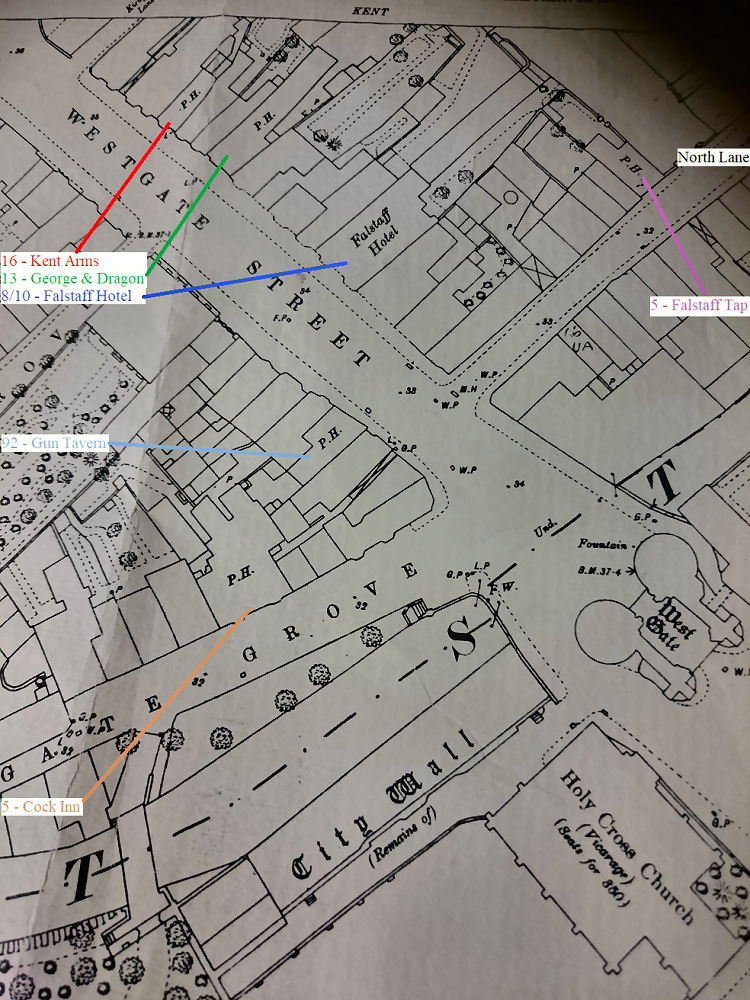
Above map 1874 identified by Rory Kehoe. |
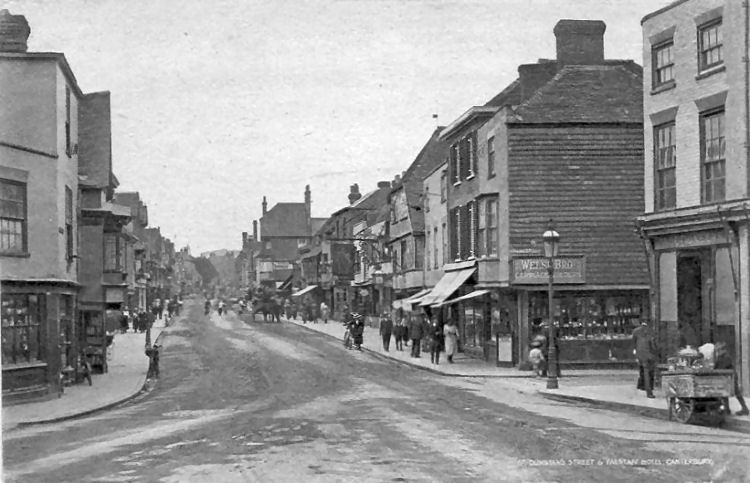
Above postcard, circa 1895, kindly sent by Rory Kehoe. |

Above postcard, circa 1895, kindly sent by Rory Kehoe. |
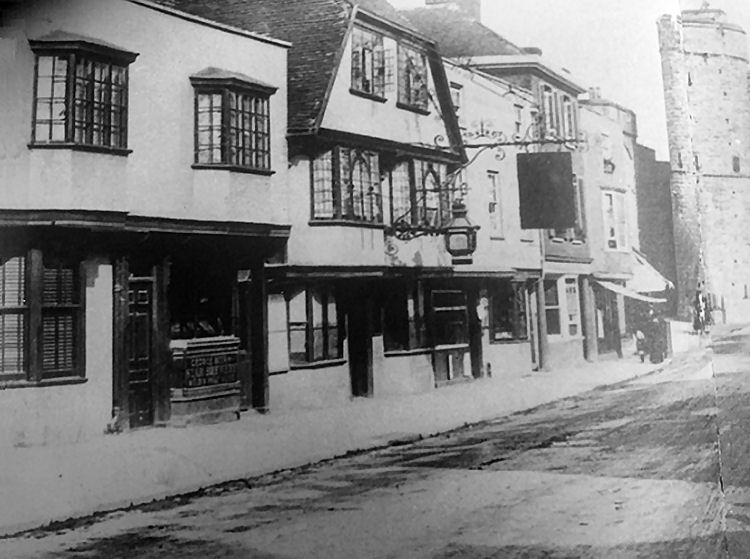
Above photo, 1897. Kindly sent by Rory Kehoe.
The Falstaff Hotel (certainly in the early 1900s) was supplied
(owned?) by Ash's Dane John Brewery. To the left of the door can clearly
be seen George Beer, Star Brewery, Mild and Pale Ales. In later
pictures, this part of the Hotel has been knocked though to create an
undercroft, or maybe there was one there anyway and it was restored to
allow vehicle access. It is strange to think that George Beer would lose
the Hotel to a competitor but I guess we'll never know. Well, unless
someone out there knows differently! |
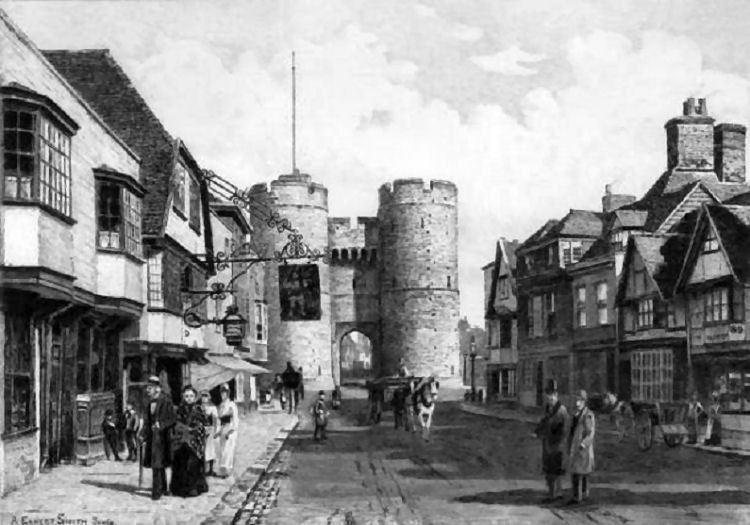
Above painting 1898, kindly sent by Rory Kehoe. Also showing "Gun
Tavern" on right. |
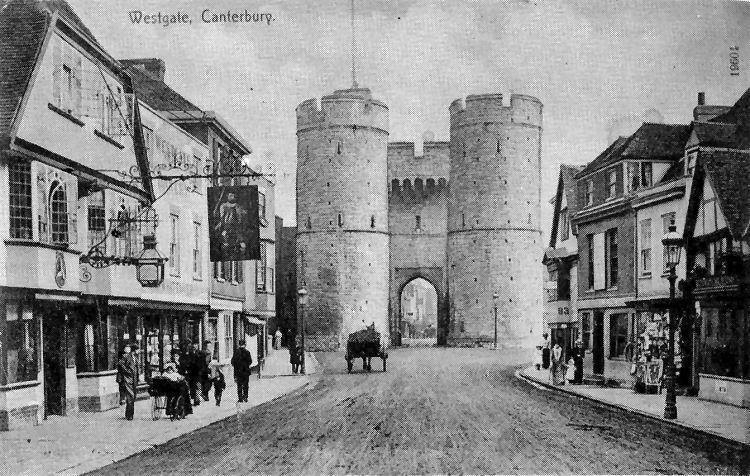
Above photo circa 1900, also showing the "Gun"
on the right. |
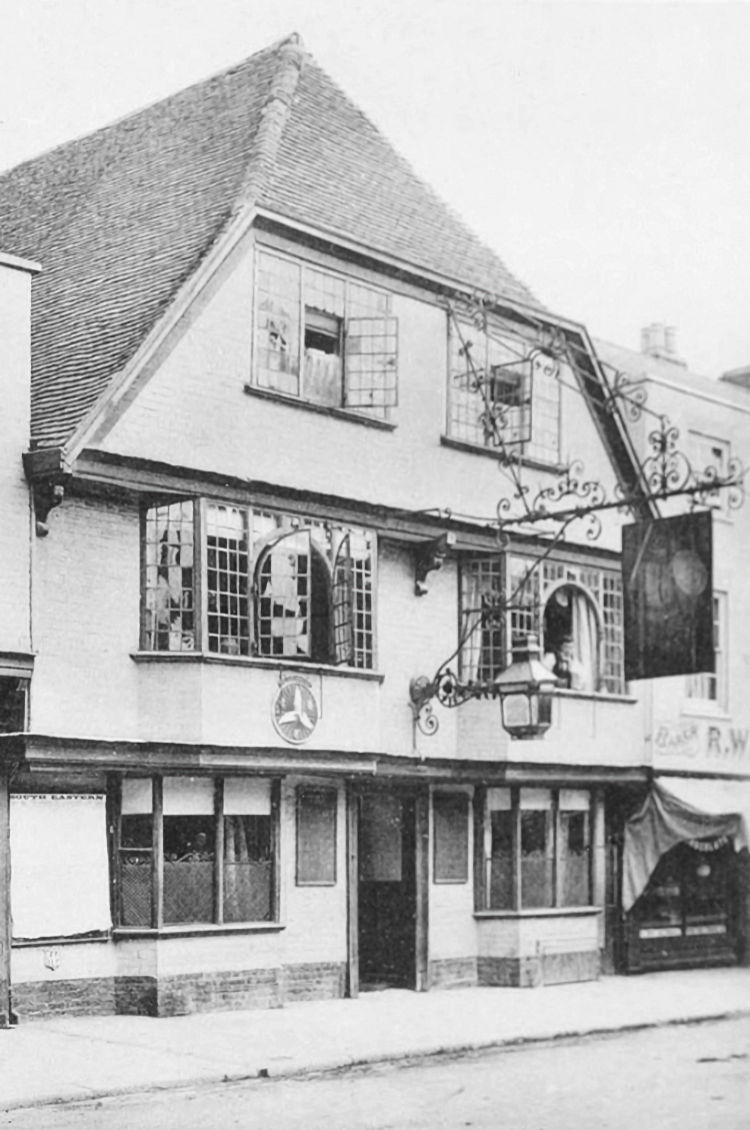
Above photo circa 1900. |
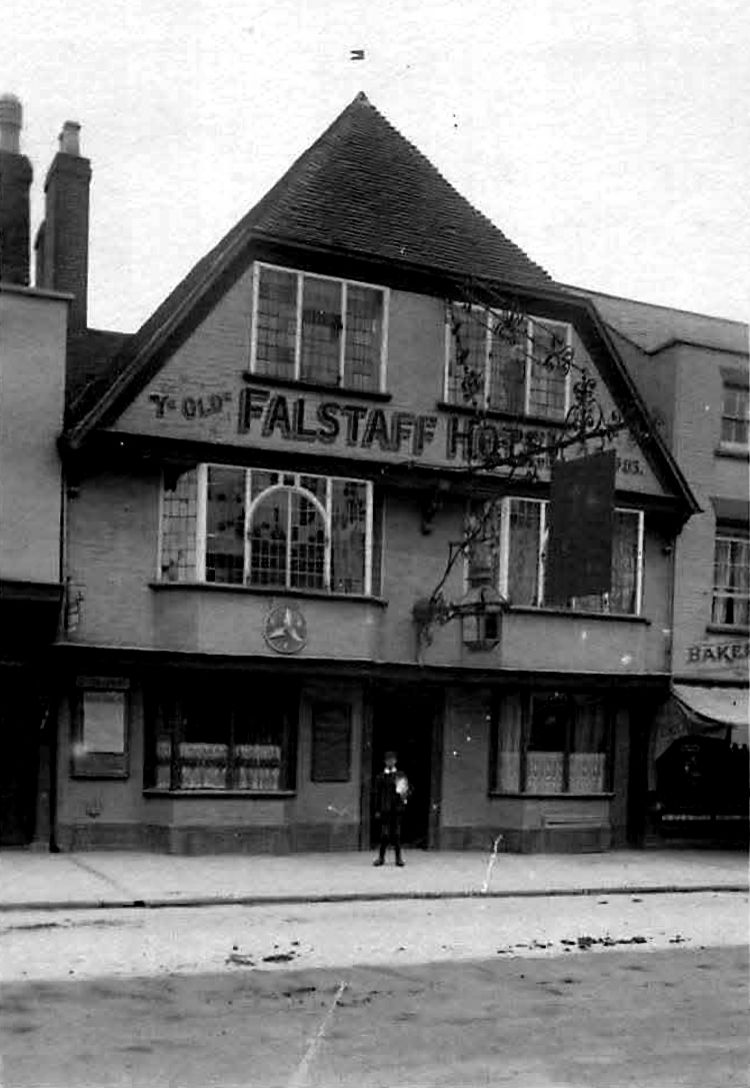
Above photo, circa 1900. |
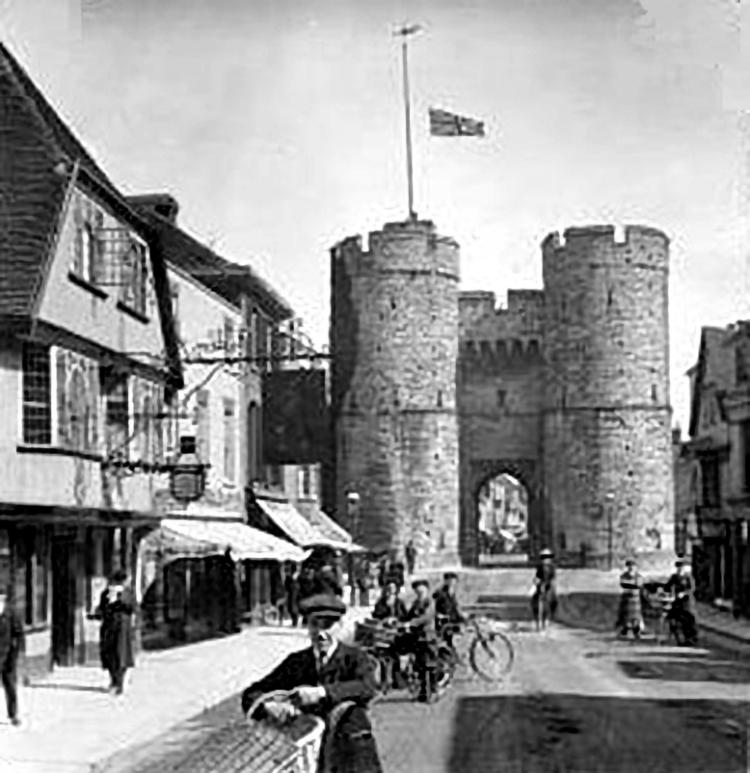
Above photo, circa 1901, kindly sent by Rory Kehoe. Flag flying at
half-mast possible in respect of Queen Victoria's death. |
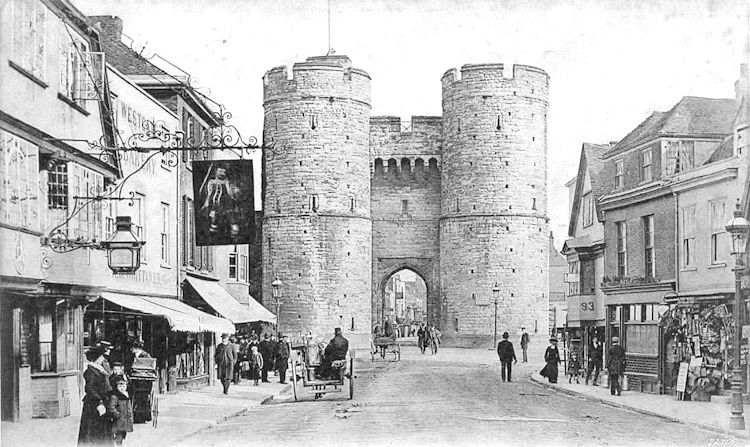
Above postcard, 1902. |
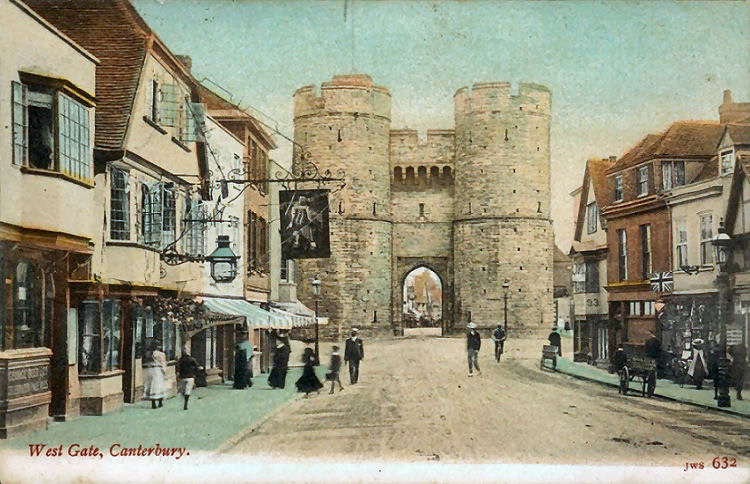
Above postcard, circa 1905, kindly sent by Rory Kehoe. |
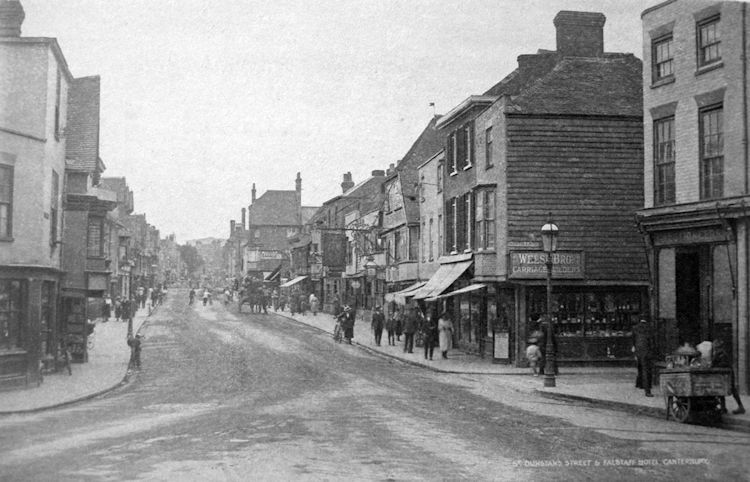
Above photo, circa 1908, kindly sent by Rory Kehoe. A nice Edwardian
view of St. Dunstan's, looking north from the Westgate Towers. In shot
but not really discernible, are the following long-since disappeared
pubs: "Gun Tavern" (L
foreground) "Rose &
Crown" (L of centre) "George
& Dragon" (just past the "Falstaff,"
now called the "Bishop's Finger")
"Kent Arms" (a couple of doors
along from the "George
and Dragon") and the "Catherine
Wheel" (about 10 doors up from the "Kent
Arms") which is now (2026) Hedger's the butchers. |
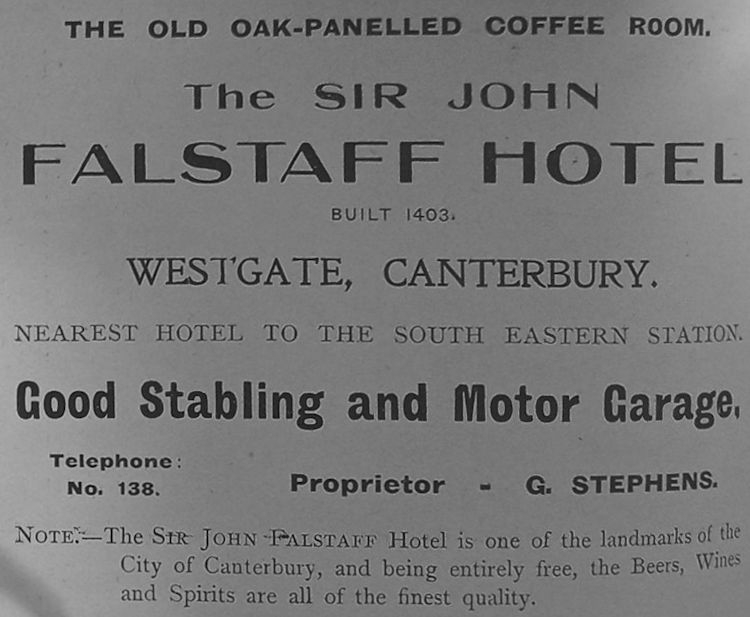
Above advert 1909. Kindly sent by Rory Kehoe, published in A Penny Guide
to Canterbury. |
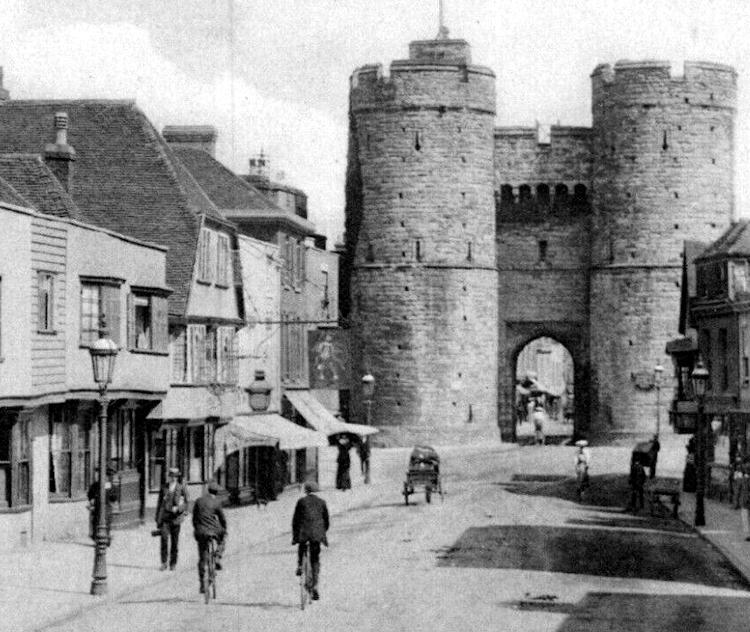
Above photo, circa 1909, kindly sent by Rory Kehoe. |
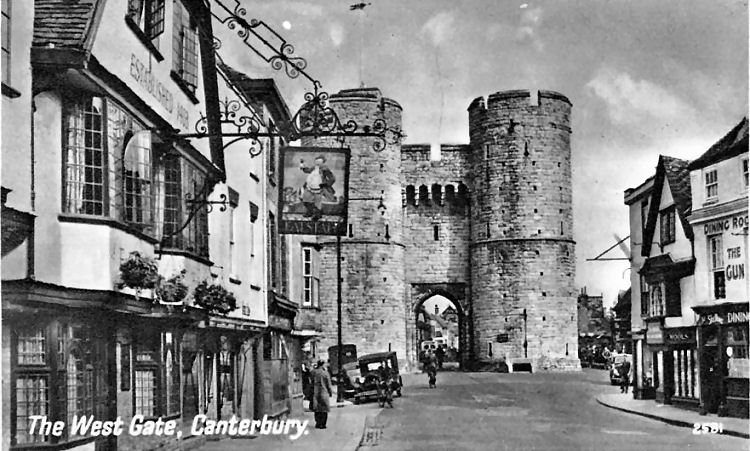
Above postcard showing "Falstaff" and the Westgate, date unknown. |
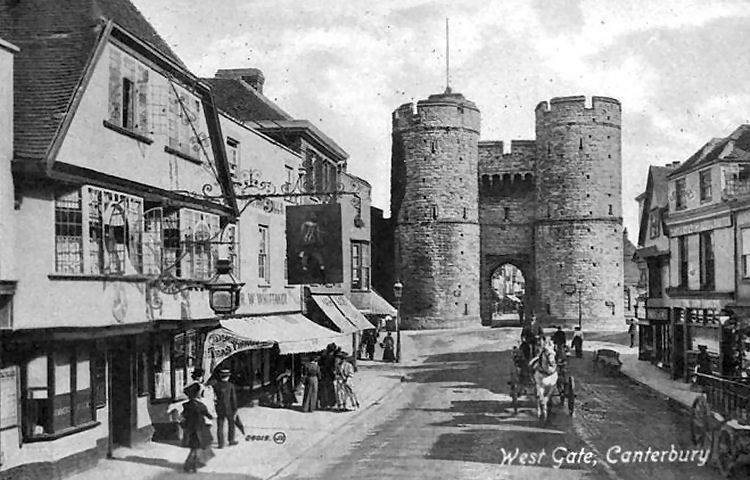
Above postcard circa 1910. |

Looks like a coloured close-up of the one above. Kindly sent by Rory Kehoe. |

Above postcard, date unknown. |
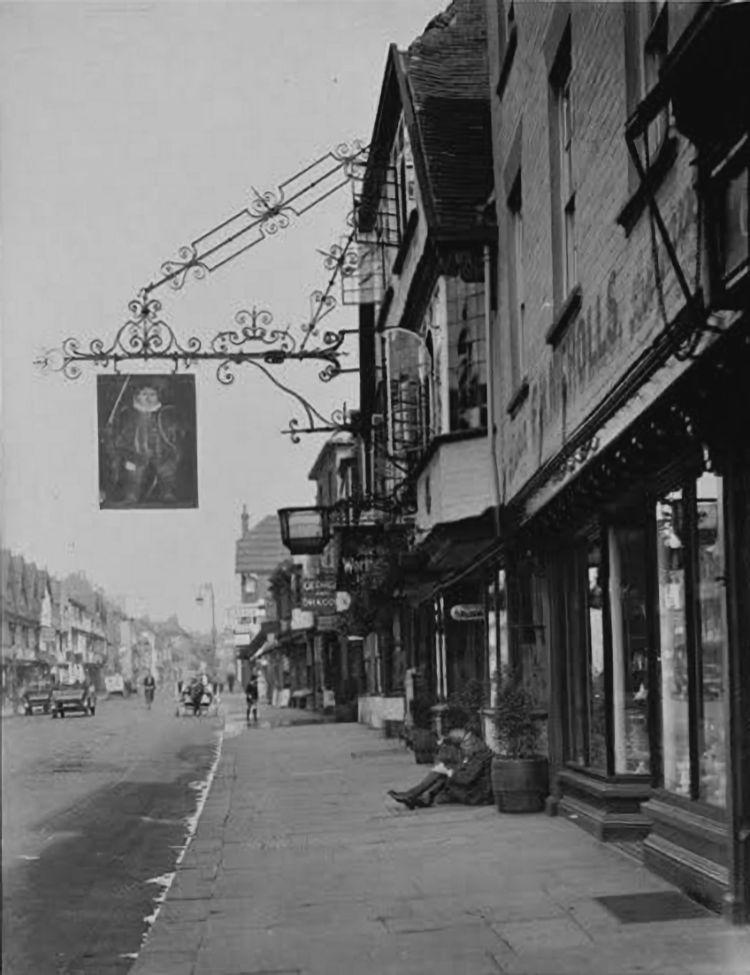
Above photo, 1920s. |
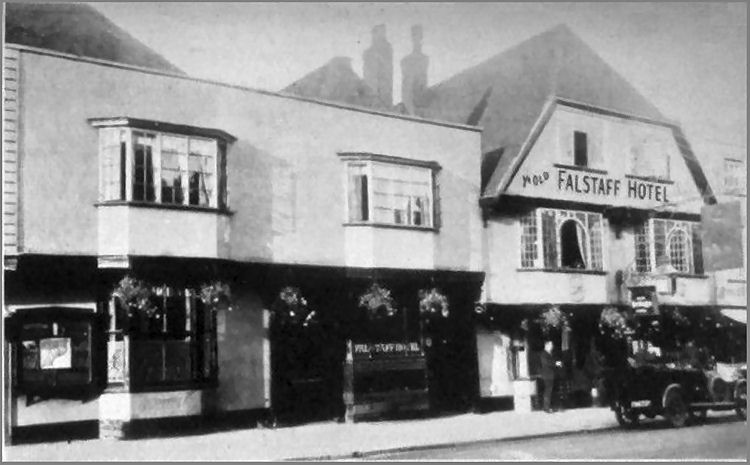
Above photo, circa 1925, kindly sent by Rory Kehoe. |
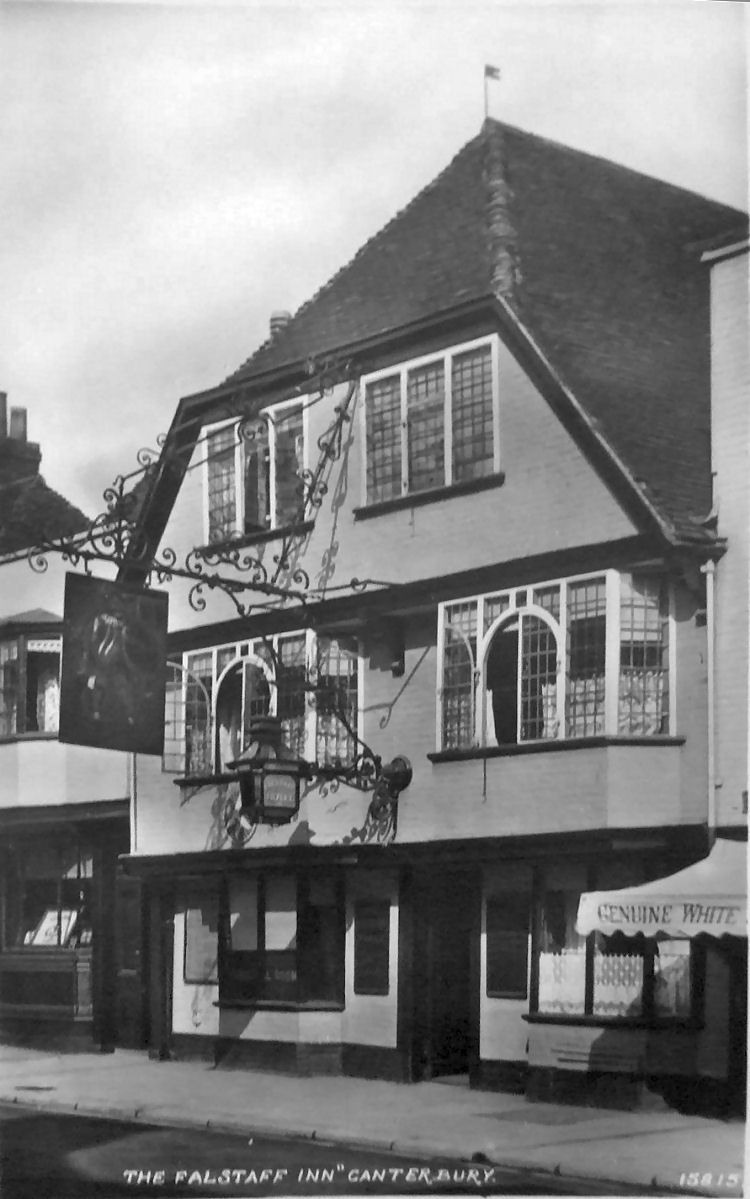
Above postcard, date 1930, kindly sent by Mark Jennings. |
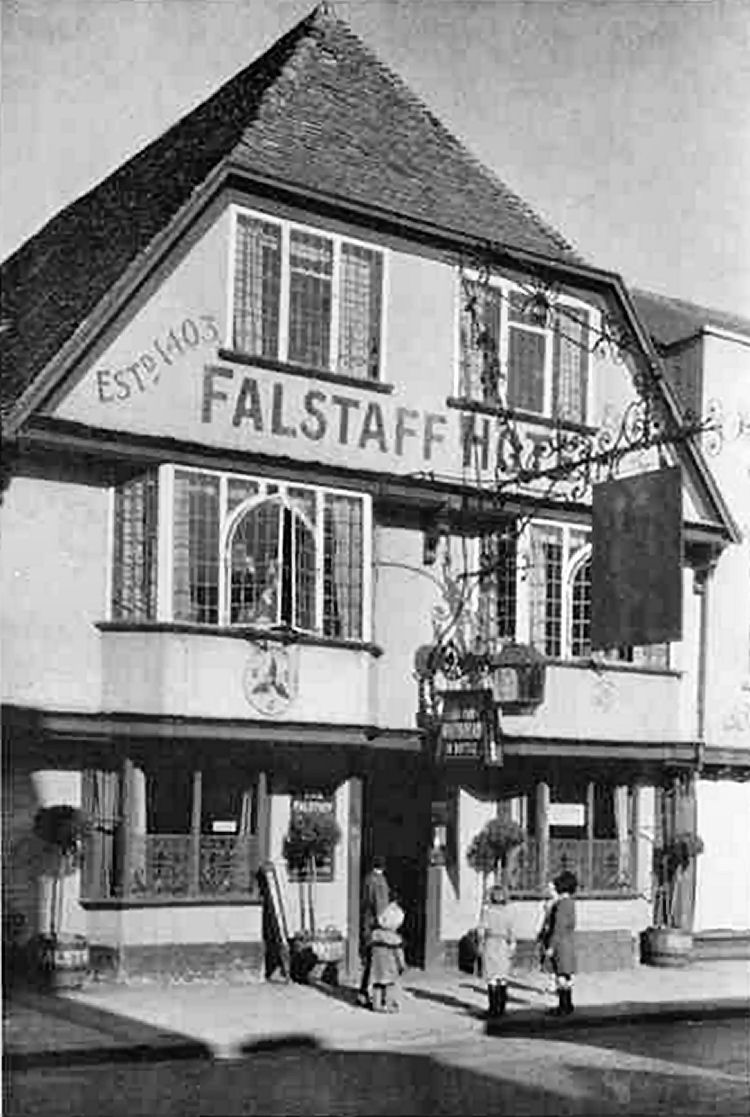
Above postcard, date 1935, kindly sent by Mark Jennings. |

Above photo, April 1941. |
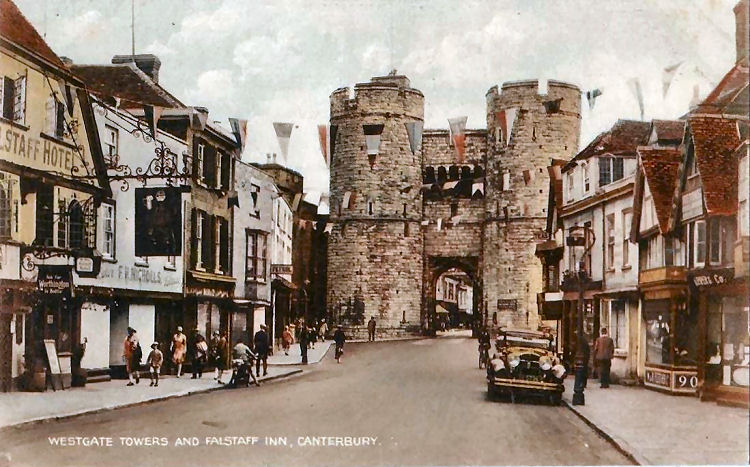
Above postcard, date unknown, kindly sent by Mark Jennings. |

Above postcard, date unknown. |
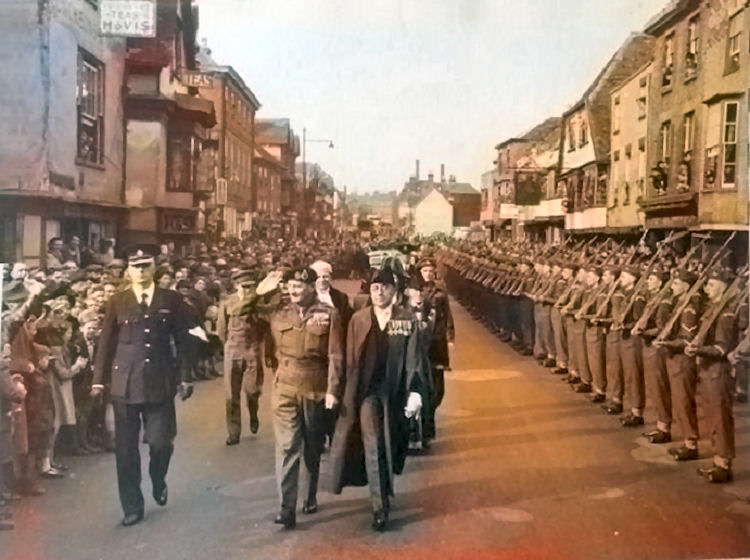
Above photo, 20 October 1945 showing procession with Field Marshall
Bernard Law Montgomery, kindly sent by Rory Kehoe. |
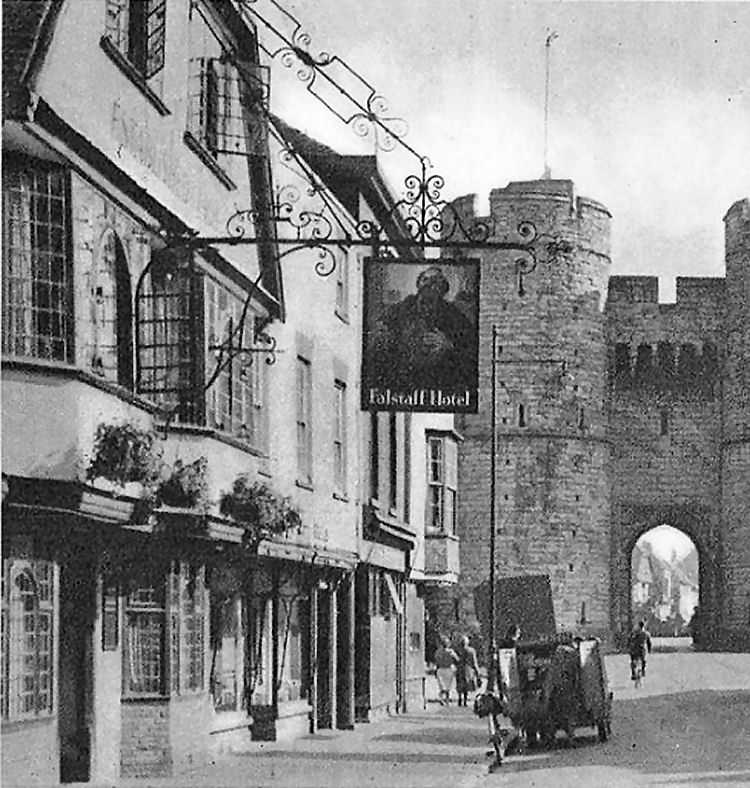
Above photo, circa 1948, kindly sent by Rory Kehoe. |
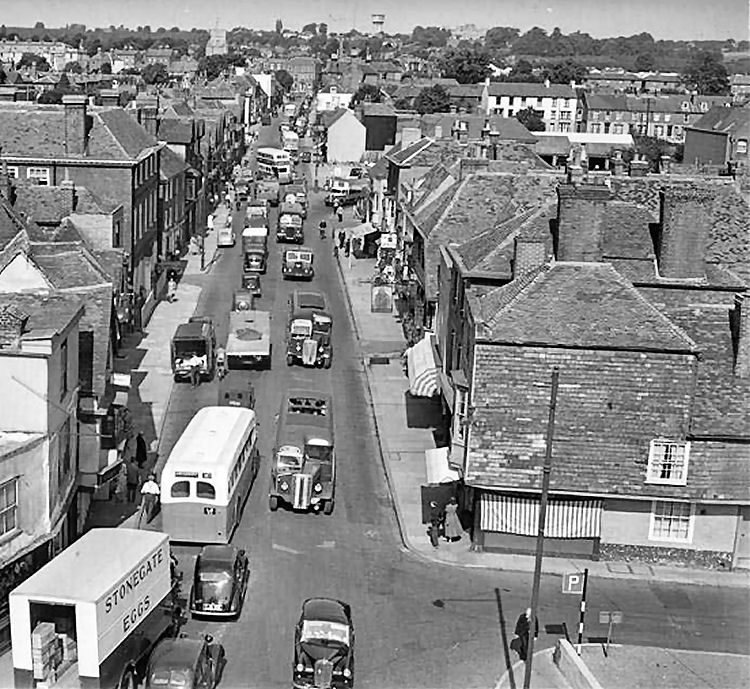
Above photo, circa 1949, kindly sent by Rory Kehoe. |
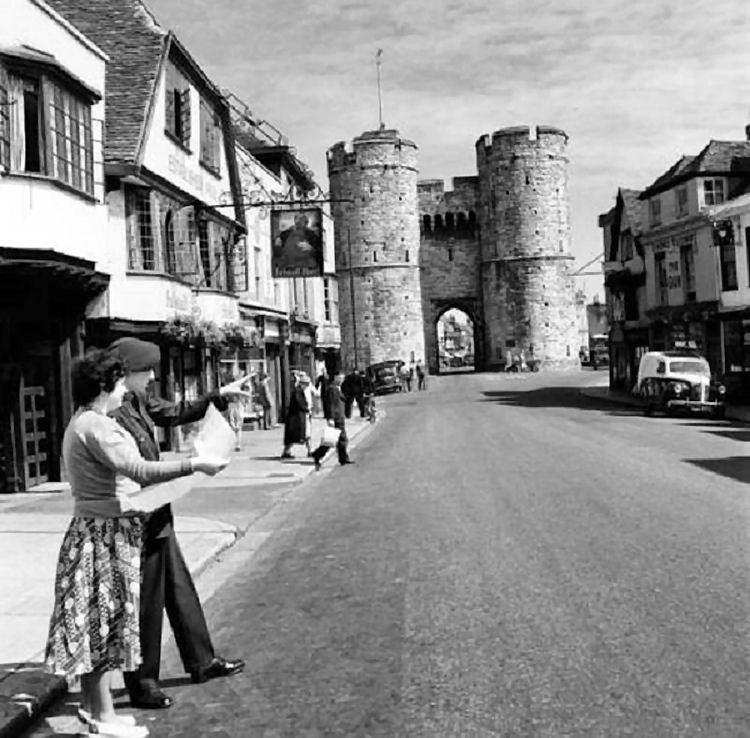
Above photo, circa 1952, kindly sent by Rory Kehoe. |
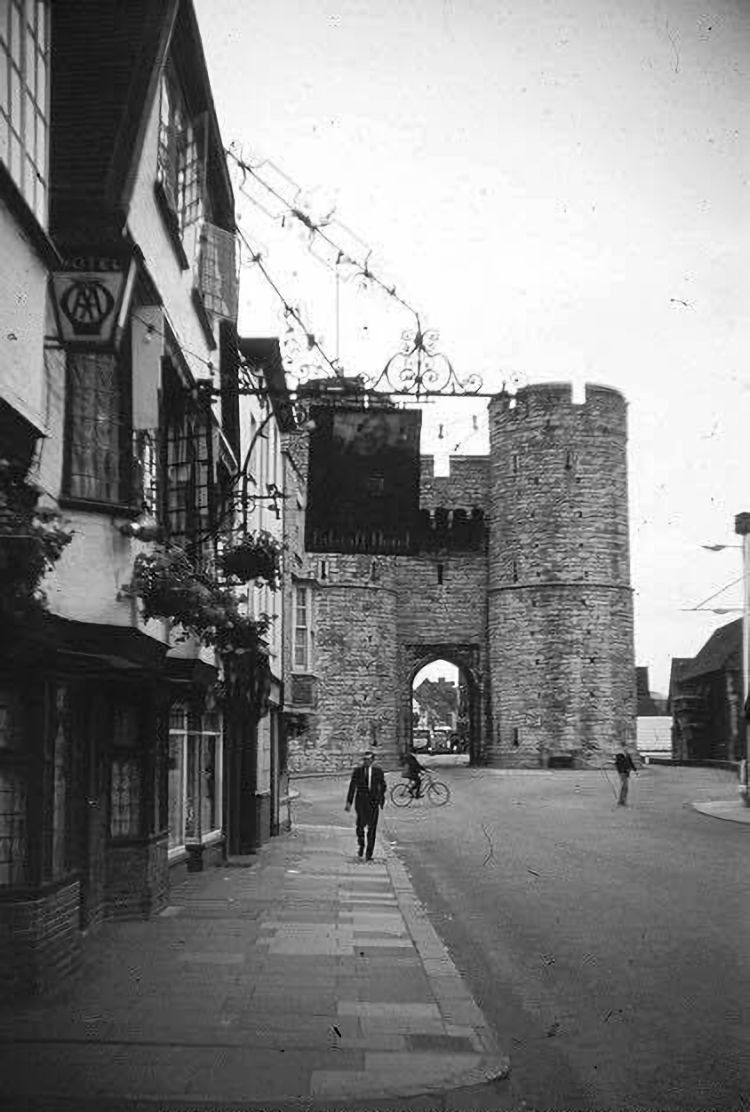
Above photo 1965. |
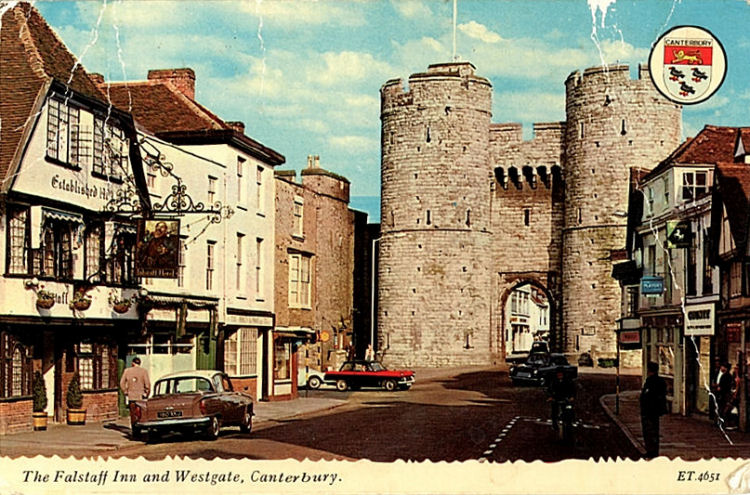
Above postcard, circa 1965, kindly sent by Roger Woodman. |
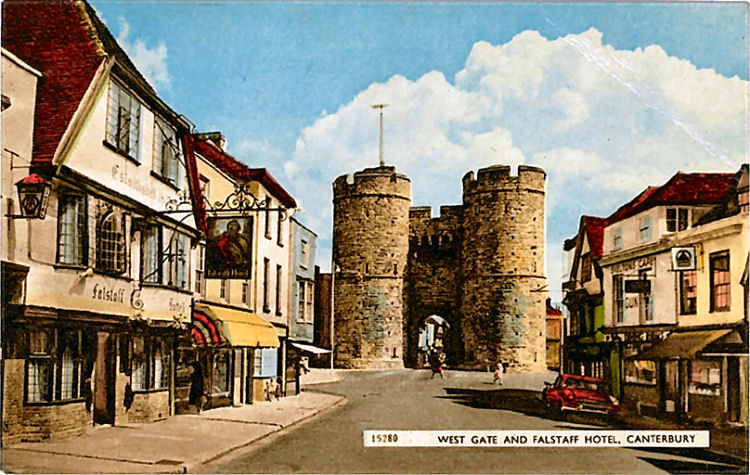
Above postcard, circa 1965, kindly sent by Roger Woodman. |
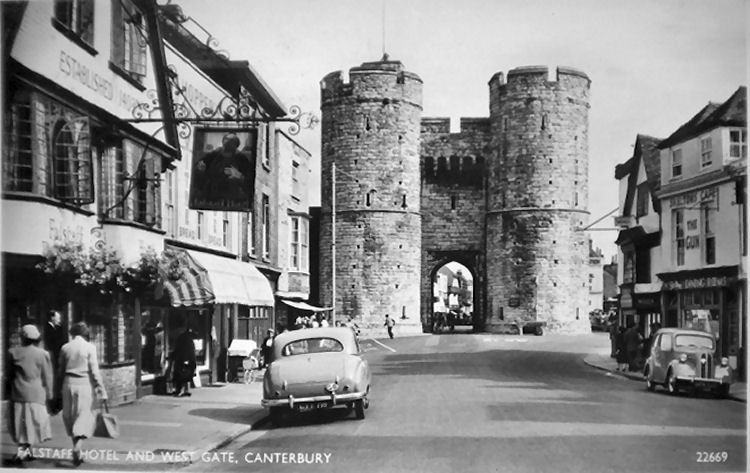
Above postcard dated 1965. |
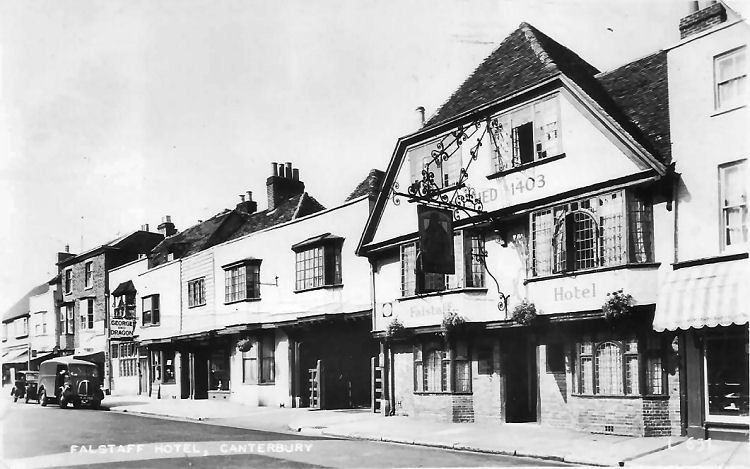
Above postcard, date unknown, kindly sent my Mark Jennings. |
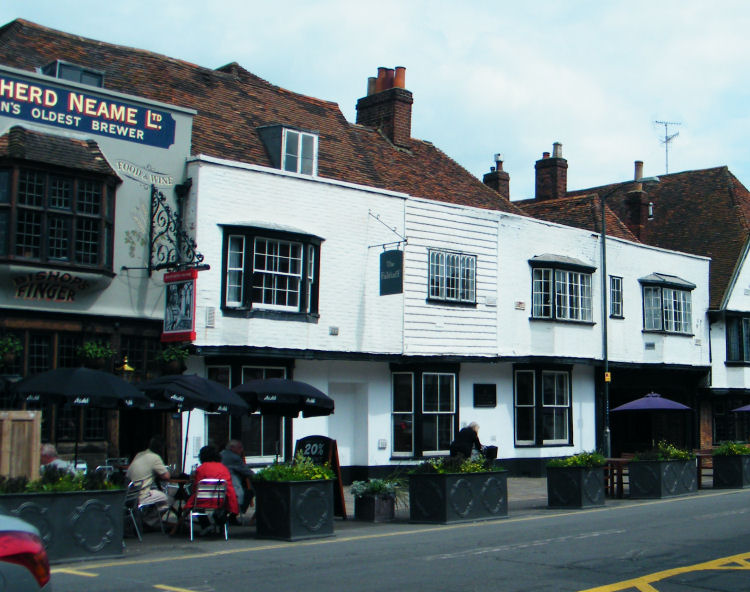
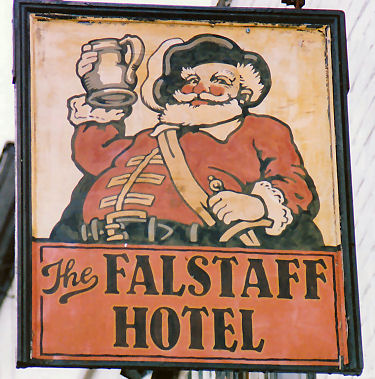 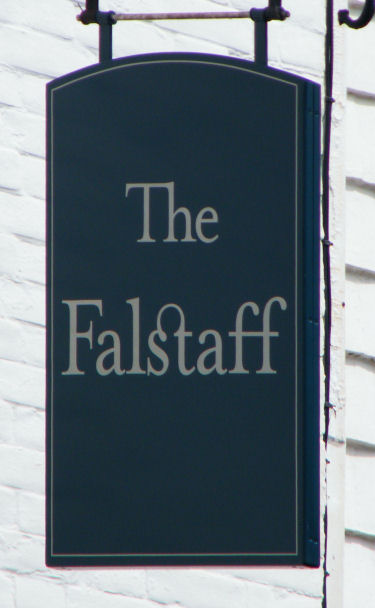
Above sign left, pre 1991, with thanks from Brian Curtis
www.innsignsociety.com
Above photos right taken by Paul Skelton, 19 May 2012. |
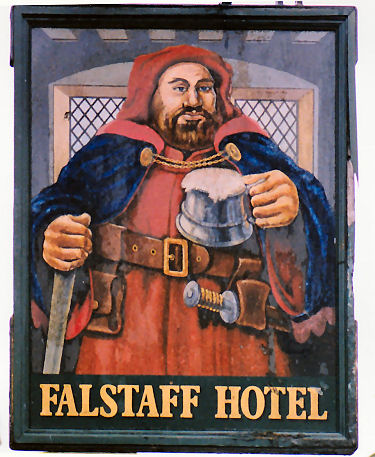 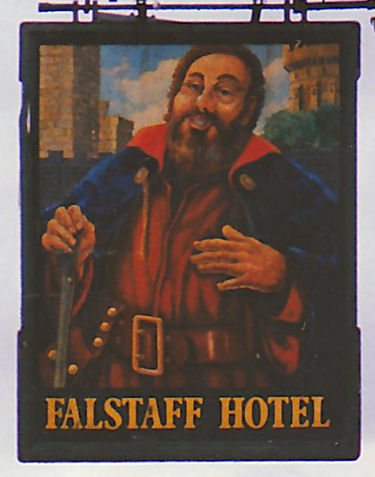
Falstaff Hotel sign left June 1991, sign right 1993
|
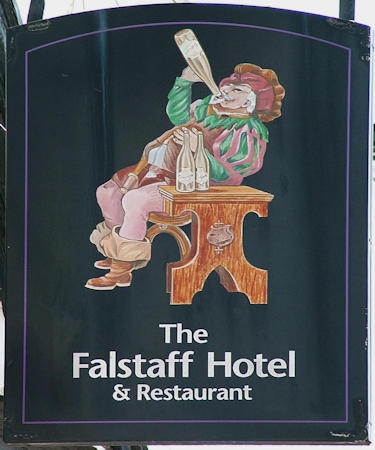
Above sign 2010.
With thanks from Roger Pester
www.innsignsociety.com.
|
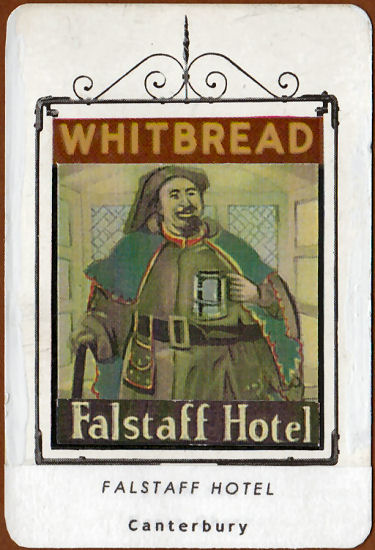 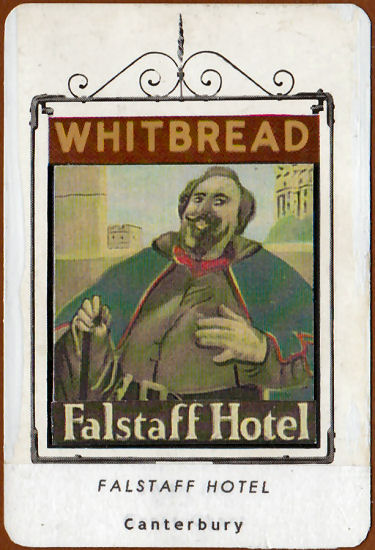
The above signs, weren't actually designed and released by Whitbread, but have
been designed by Robert Greenham in the same style as the card sets they
distributed as a representation of what the sign looked like. Robert
says:- This was based on the image which appeared on Whitbread's metal
map for East Kent which was painted by D. W. Burley in 1950, on
commission from Whitbread. |
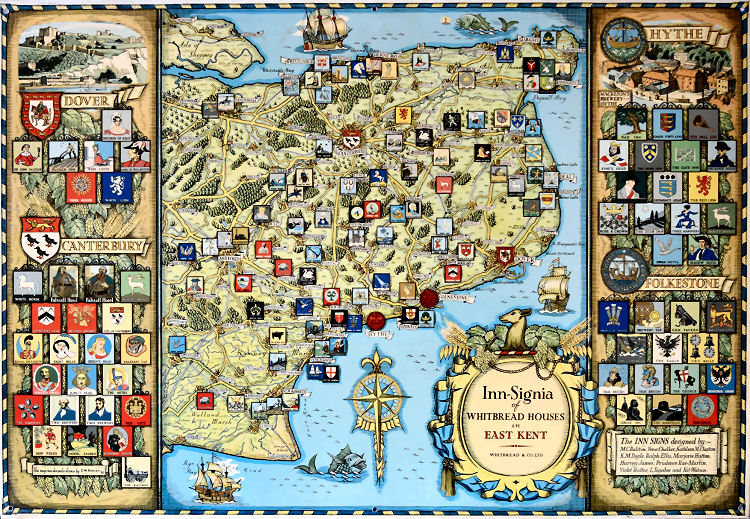
The above metal map, kindly sent by Robert Greenham was released, in
1950 and painted by D. W. Burley, and was titled Inn-Signia of Whitbread
Houses in East Kent, Whitbread & Co Ltd. The Inn Signs designed by:- M.
C. Balston, Vena Chalker, Kathleen M Claxton, K. M. Doyle, Ralph Ellis,
Marjorie Hutton, Harvey James, Prudence Rae-Martin, Violet Rutter, L.
Toynbee and Kit Watson. |
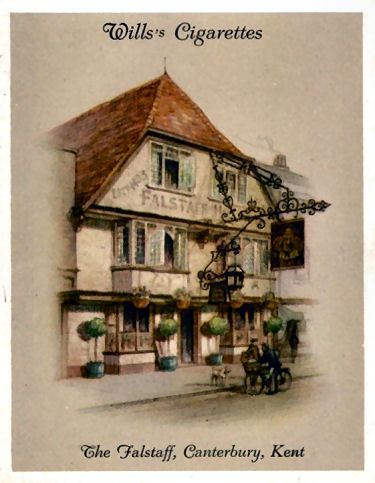 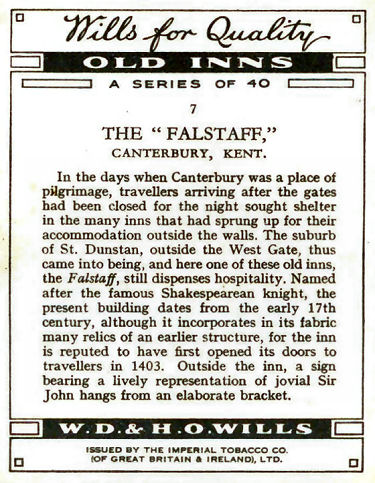
Above cards from the Wills Old Inns collection, number 7. |
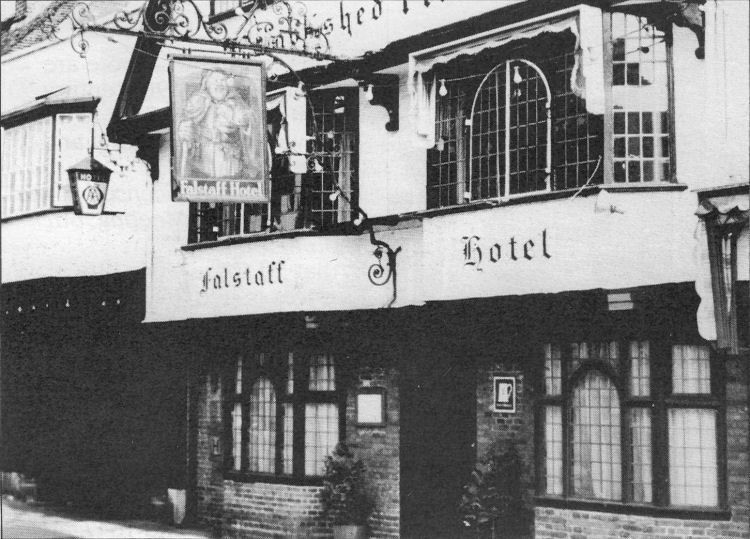
Above photograph by Edward Wilmot 1965. |
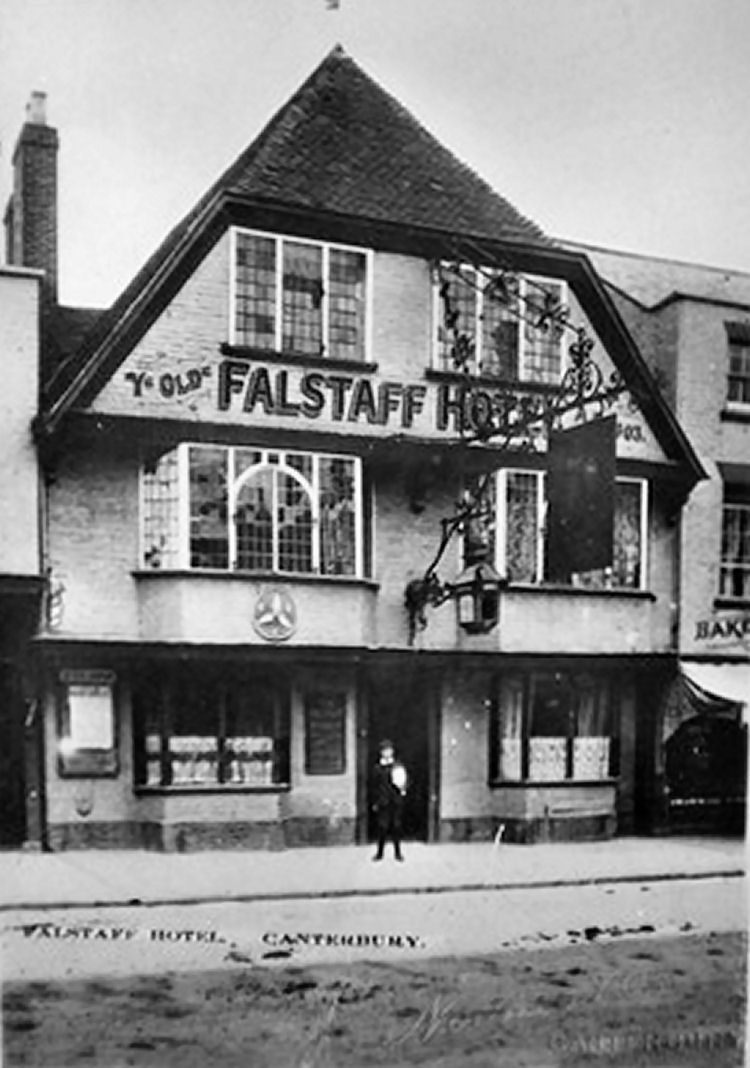
Above postcard, circa 1910. |
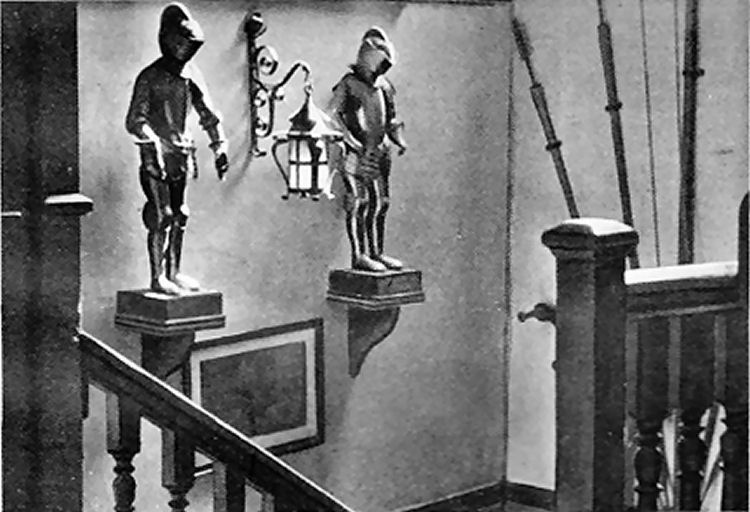
Above postcard, date unknown, showing a view inside the pub. |
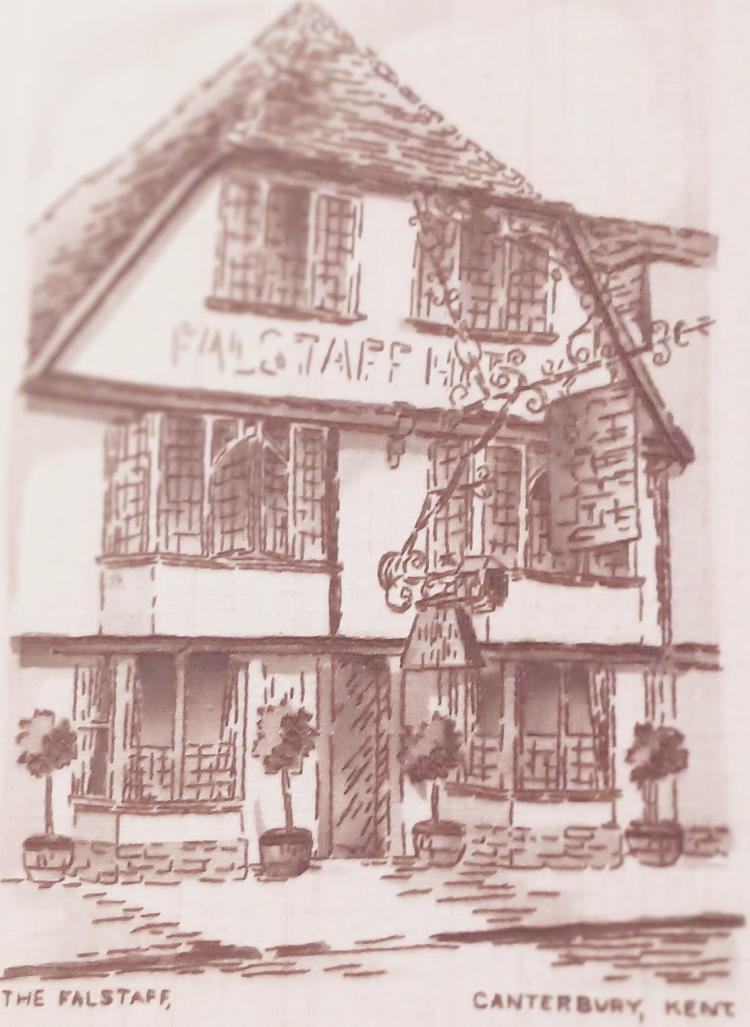
Above needlepoint design, by Penelope Design, date unknown, kindly sent
by Kristina Jennings. |
Although I have seen reference to the pub changing name from the "White
Hart" in 1783, the following passage suggests the pub was called the "Sir
John Falstaff" in 1774, so must have changed name before that year. I do not
know when it lost its title of "Sir." Earliest reference I have
found to it having the name "Falstaff" is 1769 to date.
It is said the pub has the spirit of a serving girl in what was the
upstairs function room now converted into two bedrooms.
|
From the Kentish Gazette or Canterbury Chronicle, Saturday, 1 October, to Wednesday, 5 October, 1768. Price 2d.
WANTED IMMEDIATELY
A Peruke-Maker, capable of carrying on the Business of a Peruke-maker,
Barber, and Hair-dresser. Such a Person, by applying to Mr. Gregg, at
“Sir John Falstaff's” Westgate, may hear of an advantageous Situation.
|
|
Kentish Gazette 22 February 1769.
On Tuesday next will be a Match for One Hundred Guineas, between Two
Horses, which are to Trot from the Sign of "Sir John Falstaff," in St.
Dunstan's, or the "Cock" without Westgate, Canterbury, to the Fifty-One
Mile Stone on Boughton-Hill, and back again, computed about nine Miles
and a Half: To start at Ten o'Clock precisely.
There will be a
genteel Ordinary at the "Three Tunns" in St. Margaret's, exactly at One
o''clock; where the horses may both be seen on Tuesday Morning before
starting.
|
|
Kentish Gazette 18 October 1769.
Edward Marsh, takes this opportunity of acquainting his friends, and the
publick in general, that he is removed from the "Rose and Crown," Harbledown, to "Sir John Falstaff's, in Westgate, where he has laid in a
fresh Stock of Wines, etc. and has provided good Entertainment for Man
and Horse. Whoever shall be so obliging as to favour him with their
Custom, may depend on civil Usage, and the best Accommodation, by their
obedient humble Servant, Edward Marsh. N.B. A very good Post-chaise with able Horses to be Lett; and one
Post-chaise to be Sold. |
|
From the Kentish Gazette, 1 January 1774.
LINEN-DRAPERY SELLING
By G. FLINT, removed from Mr. Lutch's, Church-gate, Canterbury.
To the "Sir JOHN FALSTAFF" in St. DUNSTAN'S STREET.
A Great Variety of printed Linen and Cotton from 18d. to 5s. per Yard. Four quarter and seven eighths Irish, from 12d to 3s per Yard, plain,
striped and flowered Muslins, from 20d to 5s. per Yard. A large quantity
of plain, striped and flowered Lawns; etc. |
|
From the Kentish Gazette, 11 October 1775.
At the Sign of "Sir John Falstaff, Canterbury.
TAKES this Opportunity to acquaint Gentlemen and Ladies, that he runs
POST CHAISES and ABLE HORSES the regular Stages at NINEPENCE per Mile.
He has good Accommodations for Gentlemen and Ladies; like wife, good
Stabling and a Coach-yard, with good Wines, &c. &c.
JOBS on easy Terms,
NOTICE.
THE following Persons beg Leave to inform the Nobility, Gentleman,
Ladies, and others, that they have agreed to run NEAT POST-CHAlSES and
ABLE HORSES, with two Passengers, and moderate luggage, to and from
London to Dover, at NINE PENCE per Mile; likewife GENTLEMEN'S CARRIAGES,
with four Horses, at ONE SHILLING and SIXPENCE per Mile, and SADDLE
HORSES to let. Edward Marsh, "Sir John Falstaff," Canterbury.
John Howard, "New Inn," Sittingbourne.
T. Champion and W. Alexander, in Chatham.
Robert Bat. "Queen's Head," Northfleet.
Joseph Leech, "Bull," Shooter’s Hill.
Good Accommodation at each House on the shortest Notice.
|
|
The following has been taken from their web site.
The 16th century accounts of the church wardens of the Holy Cross in
Canterbury mention 22 Inns where vestry meetings were held. These
include references to the "White
Hart," the early name of the Falstaff in Canterbury.
The Inn stands close to Canterbury's Westgate which was built by
Archbishop Simon Sudbury in 1380 to replace a crumbling structure erected on
the site in 1023. It was at this gate in 1067 that William the Conqueror
stopped on his way from London to Normandy to confirm the ancient law and
privileges of the men of Kent.
In 1783 (incorrect, I have dated it as early as
1769) the Inn gained its new name as The Falstaff Inn. This was an era
when many innkeepers throughout the country favoured the name, as popularity
of Shakespeare's 'large' old knight began to spread. The character appeared
first in "The History of Henry IV' (Parts 1 & 2).
Legend has it that Queen Elizabeth I was so taken with the corpulent
knight that she commented on how she would like to see him in his own story.
Shakespeare quickly wrote a new play starring Sir John Falstaff and all of
his companions and it is said that he wrote "The Merry Wives of Windsor" in
only two weeks. The Queen was delighted with the new play.
The old knight's ways have continued to amuse and delight audiences the
world over and throughout England has given some very worth Inns a new lease
of life.
A decade ago the adjacent old Woodmill building and the 'Tap' public
house were converted into more bedrooms thereby extending the original Inn
on St Dunstan's Street.
|
|
Kentish Chronicles, 4 December, 1795.
Death.
Friday died, in the Borough of Staplegate, Mr. John Marsh, formerly
of the "Falstaff Inn," in St. Dunstan's.
|
|
Kent Gazette Reports 18 June 1805.
A HORSE Detained, supposed to be Stolen.
NOTICE.
A MAN who calls himself James Kent (but is sometimes called Captain)
and says he is a smuggler, was taken into custody at Canterbury, on
Saturday Inst, on suspicion ot having stolen a FINE CHESTNUT CART
HORSE, which he had in his possession.
Whoever has lost a horse, of that description, may see the same on
application to George Hadlee, at the "Falstaff Inn," Westgate,
Canterbury,
June 18, 1805.
|
|
Kentish Gazette, 16 May, 1806.
TO BE LET.
BY Tender of Rent, on Lease, for the term of 14 years from
Michaelmas 1806.
Lot 1. All that well-established PUBLIC HOUSE, known by the sign of
the "Blue Anchor," with the buildings, yards, gardens, and
appurtenances, situate in Littlebourne street, in the county of Kent.
Lot 2. All that other well-established PUBLIC HOUSE, known by the
sign of the "King's Arms," with the buildings and appurtenances,
situate in Saint Peter's-street, in the city of Canterbury.
Lot 3. All that other well-established PUBLIC HOUSE, known by the
sign of the "Monument," with the garden and appurtenances, situate
in the parish of Saint Dunstan, in the said county of Kent.
Lot 4. All that other well-established PUBLIC HOUSE, known by the
sign of "Prince Charles," with the stable and yard, situate in the
parish of Holy Cross Westgate, in the said country of Kent.
Lot 5. All that well-established CAPITAL INN, or PUBLIC HOUSE, known
by the sign of "Sir John Falstaff," with the coach-houses, stables,
yards, gardens, and appurtenances, situate in the said parish of
Holy Cross Westgate.
All the above lots are in the occupation of Mr. John Abbott, or his
undertenants.
Tenders of rent, for either or any of the above lots, to be
delivered sealed up, on or before the 18th June next, to Mr.
Cumming, of Canterbury; of whom, in the mean time, the conditions of
letting may be seen.
|
|
Kentish Weekly Post or Canterbury Journal, Friday 15 September 1809.
Falstaff Inn. St. Dunstan's Canterbury.
George Hadlee returns is grateful thanks for the public, for the support
he has received during his residence
at the "Falstaff Inn," from which he has retired, and begs to recommend
Mr. Richard Foord as his successor.
Richard Ford, late of the "Swan Inn," Greenstreet, having taken the
"Falstaff Inn," respectfully solicits to the
support of his friends and the public, which it shall be his endeavour
to deserve, by a strict attention to their
commands, and by keeping a stock of the best wines, spirits &c.
constantly on sale.
Good beds and stabling.
|
|
Kentish Weekly Post or Canterbury Journal, Friday 27 January 1815.
To be Sold by Auction, by Messrs. White.
At the "Sir John Falstaff Inn," in the parish of Holy Cross,
Westgate, without the walls of the City of Canterbury,
in the county of Kent, on Wednesday the 8th day of February, 1815,
at 12 o'clock at noon, the following
Freehold and Leasehold Estates, in or near to the City of
Canterbury, late the property of Mr. James
Homersham, deceased, subject to such conditions as will be then
produced.
Lot 1.
....
Lot 9.
|
|
From the Kent Herald, 4 January 1827.
DEATH.
Dec. 30, at his residence in St. Dunstan's, Canterbury, Mr. Richard Foord,
formerly of the "Falstaff Inn," universally respected by all who had the
pleasure of his acquaintance, in the 54th year of his age.
|
|
From the Kent Herald, 4 July 1833
Canterbury.
"Falstaff Inn," Canterbury.
J. Dooughty respectfully announces to the inhabitants of Canterbury and
its vicinity, that he has taken that Old-established Inn, the
"Falstaff," and solicits a continuance of the patronage so liberally
bestowed on Mr. Fagg, his predecessor - to merit which, he pledges
himself to use every exertion.
J. D. Having taken the entire stock of very superior Old Port and Sherry
Wines, and Genuine Spirits, selected with so much care and judgment by
his predecessor, can with confidence recommend them to his Friends and
the Public as of the very finest quality.
|
|
From the Kent Herald, 14 November 1833
Canterbury.
Opening Dinner. "Falstaff Inn,", Canterbury.
J. Doughty, respectfully announces that his House Warming Dinner will
take place on Thursday next, Nov. 21st, on which occasion he solicits
the patronage of his friends and the gentleman of Canterbury and it's
vicinity.
Tickets, including a bottle of wine and dessert, 10s.
Dinner on table at 3 o'clock.
|
|
From the Kentish Gazette 7 August 1838.
THE FALSTAFF INN.
TO BE LET, and entered upon Immediately, (the present proprietor
leaving the city), that old established and well-known Free House
the "FALSTAFF INN," in St. Dunstan's, Canterbury, now doing an
excellent trade.
For particulars apply to Mr. Doghty, on the premises; or to Mr.
William Sharp, Burgate Street.
|
|
From the Kentish Gazette, 16 October 1838.
FALSTAFF INN. SAINT DUNSTAN’S, CANTERBURY.
JOHN DOUGHTY, in retiring from the above Inn, to the "PRINCE of ORANGE,"
GRAVESEND, gratefully acknowledges the kind support he has received,
and respectfully solicits a continuance to his successor, Mr. Robert
Fox.
ROBERT FOX in soliciting a continuance of the patronage bestowed on his
predecessor, takes the opportunity to assure his friends, the
Inhabitants of Canterbury and its Vicinity, that every effort shall he
made to merit their support; and by moderate charges, strict attention
to every department of the business, he earnestly hopes to secure a
liberal share of their favors.
Wines and Spirits of the choicest quality.
Truman and Hanbury’s London Porter, and Home-Brewed Ales.
|
|
From the Kentish Gazette, 3 November 1840.
FALSTAFF INN, CANTERBURY.
ROBERT G. FOX humbly solicits the orders of his Friends and the Public
generally to his superior Stock of WINES and SPIRITS, BOTTLED ALES and
STOUT, and trusts, from the quality of his goods and the moderate
prices, to ensure a good share of their support. All goods delivered
free within ten miles in any quantities.
R. G. F. at the same time respectfully offers his thanks for the
support, both in and out doors, he has received since entering upon the
above House, and begs to assure his friends that neither a good article
nor attention shall be wanting to entire a continuance of their
patronage already so liberally bestowed.
|
|
From the Kentish Gazette, 19 July 1842.
NOTICE. CANTERBURY RACES. YEOMANRY PURSE.
THE Entree of Horses for this Race, was unavoidably POSTPONED on
Saturday last, until the 6th of AUGUST next, on which day they can be
entered at the "Falstaff Inn," between the hours if Five and Eight.
All other Entries, the same as advertised in the Kentish Gazelle, July
12th.
Canterbury, July 18th, 1842.
|
|
From the Kentish Gazette, 28 March 1843.
CANTERBURY. TO BE SOLD BY AUCTION, By H. S. WESTFIELD,
ON WEDNESDAY, MARCH 29th, 1843, at the "FALSTAFF INN," St. Dunstan’s
Street, CANTERBURY, the property of Mr. R. G. Fox, who is leaving the
business;
Comprising sixty dozen of very superior choice old Port, and a variety
of other Wines; about sixty dozen of Scotch and Welsh Ales, light Cart
on springs, superior Stanhope, Chaise Harness, excellent gig Horse five
years old, yellow painted Chariot, set of double Harness, light Wagon on
springs, Pony Cart, Phaeton, useful Horse and Harness, a quantity of
Spanish Mahogany, and many other useful articles, which will be
particularised in catalogues, to be had on Saturday previous to the day
of Sale of the Auctioneer No. 16, St. George’s Terrace, Canterbury and
at the place of Sale.
Sale to commence at Eleven o'clock.
|
|
From the Kentish Gazette, 25 April 1843.
C TREVOR, in announcing to his Friends and the Public that he has left
the "LION HOTEL," begs to return his thanks for the support he received
whilst there, and also to recommend to their friendly notice his
successor, Mr. R. G. FOX.
The BOTTLED ALE and PORTER TRADE will be carried on as usual by C. T.,
at his Grocery Establishment, 21, High-street.
ROBT. G. FOX, having removed from the "Falstaff Inn," St Dunstan, in
succeeding Mr. C. Trevor at the "LION HOTEL," High-street, CANTERBURY,
earnestly solicits the support of the Gentry, his Friends, and the
Public generally, to the above spacious and excellently fitted
Establishment, which has lately undergone, at a great expense, all
repairs necessary to render it convenient and comfortable; and trusts,
by moderate charges, strict attention to the business, and superior
articles, to merit a liberal share of their patronage.
The Stables and Yard, which are also well arranged, have undergone
thorough repair, offering good accommodation to livery or bait horses.
R. G. F. at the same time begs to call the attention of his Friends to
his superior Stock of WINES and SPIRITS, which he will continue to serve
in any quantity, and on the same liberal terms as heretofore for Cash.
N.B.— A good Ordinary every Saturday at Half-past One o’clock.
|
|
From the Kentish Gazette, 23 May 1843.
THE OPENING DINNER at the "FALSTAFF CANTERBURY," will take place on
THURSDAY First of JUNE.
Alderman MASTERS in the Chair. Tickets, 3s. 6d., Including Dessert.
Dinner on Table at Three o’clock.
|
|
From the Kentish Gazette, 5 September 1843.
FALSTAFF INN, WESTGATE CANTERBURY.
E. BIRCH,
In respectfully acknowledging the very liberal support he has received
from his friends and the public generally, from the short time he has
been engaged in the above Establishment, takes the opportunity of
informing them that House and Premises have recently been ALTERED and
IMPROVED, so as to increase their comfort and convenience, by which,
with WINES and other REFRESHMENTS of the BEST QUALITY, and GOOD BEDS,
with moderate charges, he hopes to secure a continuance of their kind
favours.
Extensive STABLES and Lock up COACH-HOUSES, have been newly erected, and
are now complete, with every accommodation for families travelling, for
commercial gentlemen, and other visitors to Canterbury.
N B.— LIVERY STABLES.
|
|
Kentish Gazette, 28 May 1844.
COMMERCIAL HOTEL, "FALSTAFF INN,"
SAINT DUNSTAN’S STREET, CANTERBURY.
EDWARD BIRCH offers his grateful thanks to his Friends for the support
he has received during the time he has conducted the above OLD
ESTABLISHED INN and COMMERCIAL HOUSE, and at the same time begs to
inform the Public generally, and more particularly COMMERCIAL GENTLEMEN
and FAMILIES TRAVELLING, that while the best of accommodation is
provided within doors, the out door establishment is of the first
description, the stabling being commodious and entirely new built, with
lock-up coach-houses, &c., &c.
Gigs and Saddle Horses to let or hire, on the most reasonable terms.
N.B.— Livery and Bait Stabling.
|
|
Kentish Gazette, 19 November 1844.
FALSTAFF INN, CANTERBURY.
E. BIRCH begs to acquaint his Friends and the Public generally, that his
ANNUAL HOP DINNER will take place on TUESDAY, the 26th
instant.
Dinner on Table at Four o'clock precisely.
|
|
Kent Herald, 30 January 1845.
Births.
Jan.27, the wife of Mr. E. Birch, of the "Falstaff Inn," Canterbury, of twins, a
son and daughter.
|
|
Kent Herald, 15 May 1845.
May 12. Summons issued against Frederick Saunders, one of the overseers of the
poor of Westgate-without for granting a full certificate of rating to enable
James Feaking of North Lane, to obtain an excise licence to retail beer. Case to
be heard on Thursday (this day.)
May 13. Steven Brown the younger, charged with sending a letter to Mr. Birch, of
the "Falstaff Inn," threatening to set fire to his premises, was discharged with
a severe reprimand, the breach of the peace not having been pressed against him,
upon his expressing his contrition.
|
|
From the Kentish Gazette, 25 November 1845.
FALSTAFF INN, SAINT DUNSTAN'S, CANTERBURY.
E. BIRCH, BEGS to inform his Friends that his Annual HOP BETTING DINNER
will take place on THURSDAY Next, NOVEMBER 27.
Dinner on Table at Four o'clock.
|
|
From the Kentish Gazette, 17 February 1846.
RAILWAY HOTEL. FALSTAFF INN, ST. DUNSTAN'S, CANTERBURY,
EDWARD BIRCH BEGS most respectfully to offer his thanks to his friends
and the public generally, for the kind patronage conferred on him during
the time he has conducted the above establishment, and respectfully
solicits a continuance of the same.
E. B. also begs to call the attention of persons travelling by the
South-Eastern Railway, that the "Falstaff" is near adjoining the
Canterbury Station, and that he provides conveyances to and from the
coast and surrounding country.
N. B.— Good Beds and excellent Stabling, with lock-up Coach-houses.
|
|
From the Kentish Gazette, 29 September 1846.
FALSTAFF INN, near the RAILWAY STATION, ST. DUNSTAN'S STREET, CANTERBURY.
EDWARD BIRCH, IN gratefully acknowledging the kind patronage with which
his Establishment has been favoured, begs respectfully to inform his
friends and the public generally that he has on draught a choice supply
of CROWLEY’S GENUINE ALTON ALES, so universally approved of, and hopes,
by supplying Wines, Spirits, and other refreshments of the best quality,
at moderate charges, to meet a continuance of their favours, which to
deserve will ever be his study.
The "Falstaff" is open for the accommodation of travellers by the Night
Mail Railway Train.
Good Beds, Stabling, and lock up Coach houses.
Close and Open Cabs on hire by the day or hour.
|
|
Kentish Gazette, 16 November 1847.
Hop Dinner.
The first of these social meetings, took place on Thursday last, at the
"Falstaff Inn," St. Dunstans. Upwards of thirty gentleman sat dawn to a
well-served dinner, consisting of turbot and other fish, haunches of
mutton and other favourite dishes of meat, game, &c. &c. The wines were
excellent, and elicited high commendation. Mr. E. Bennett ably presided,
and the conviviality of the evening was maintained uninterrupted to a
late hour. The duty of 1848 was set at £150,000.
|
|
Kentish Gazette, 3 December 1850.
On Thursday the city magistrates transferred the license of the
"Falstaff Inn," St. Dunstan’s, from E. Burch to Susannah Coulter, late
of Rochester, but now the occupier of the house.
|
|
Kentish Gazette, 24 December 1850.
MR. POUT has received instructions TO SELL BY AUCTION,
ON FRIDAY, the 27th December, 1850, (without reserve) at the "Falstaff
Inn," WESTGATE-STREET, CANTERBURY.
About FIFTY DOZEN of PRIME PORT WINES, the property of Mr. Edward Birch,
late of the "Falstaff Inn," leaving Canterbury.
Sale will commence at Eleven o'clock.
|
|
Kentish Gazette, 4 March 1851.
Canterbury and Harbledown.
Desirable Freehold and Leasehold Estates, and Life Assurance Policy, to
be sold by auction by Messrs. Cooper. On Thursday
the 6th day of March 1851, at three o'clock precisely at the "Falstaff
Inn," Canterbury.
By order of the Devieces in Trust under the Will of the late Mr. John
Collins, and subject to such conditions shall be then and
there produced.
Lot 11. All that Messuage, Tenement, or Public House, called
"Whitehall," with the buildings, gardens, pleasure ground,
bowling green, and 2 pieces or parcels of pasture land thereto
adjoining, containing 9 Acres more or less, situate and being in
the parish of St. Michael, Harbledown, in the county of Kent and now in
the occupation of Thomas Howland at the yearly rent of £30.
The above well-known property is held under a lease from the Master of
Kent Bridge Hospital, Canterbury for 21 years, from
11th October, 1842, at yearly rents amounting to £3 8s. Is situated
within one mile of the City of Canterbury, and abuts on the
South Eastern Branch Railway, from Canterbury to Ashford.
|
|
From the Kentish Gazette, 23 June 1857.
TYLER HILL, near CANTERBURY.
TO BREWERS AND OTHERS.
TO BE SOLD BY AUCTION, BY MESSRS T. AND H. COOPER,
AT the "FALSTAFF INN," CANTERBURY, On FRIDAY, the 26th JUNE, 1857,
At Three o’clock in the Afternoon, to a minute.
IN TWO LOTS.
Lot 1:— A desirable FREEHOLD DWELLING-HOUSE (now used as a licensed
beer house), with a large stable, outbuildings, yard, and garden,
containing about a quarter of an acre, very pleasantly situated at
TYLER HILL, in the parish of St. Stephens, in the county of Kent;
within about a mile and a half from Canterbury, and now occupied by
Mr. Henry Chappell. Independently of a Beer House, these premises
are well adapted for a Country Grocer’s Shop, which is much wanted
at Tyler Hill.
Lot 2:— A piece of excellent FREEHOLD GARDEN GROUND, well stocked
with fruit trees, adjoining Lot 1, containing 42 Perches, now
occupied by Mr. Chappell.
This piece of Ground is well suited for building on, having a long
frontage towards the High Road.
There is a well of good Water on each Lot.
For further particulars apply to the AUCTIONEER; or to MESSRS.
SANKKY and SON, Solicitors, Canterbury.
|
|
From the Canterbury Weekly Journal, 11 April 1863.
Thursday. [Before the Mayor, Alderman Philpott, and W. H. Trimnell, Esq.]
Transfer of Licenses.
The licence of the "Sir John Falstaff" licence was transferred from Anne Fletcher to John
Young.
|
|
From the Kentish Chronicle, 26 March, 1864.
THE SIR JOHN FALSTAFF SIGN.
A memorial to the Pavement Commissioners, asking that body to spare the
“Sir John Falstaff” sign from its proposed fate, and to permit the
favourite portrait to hang over the pavement as before, lies for
signature at the Canterbury Bank.
|
|
From the Kentish Chronicle, 16 April, 1864.
THE SIR JOHN FALSTAFF SIGN.
The Clerk having read the minutes of the last meeting, read a memorial
from eleven innkeepers in the parish of Westgate Without, asking to be
allowed to suspend sign boards, similar to the one permitted in front of
the “Falstaff Inn.”
Mr. Gee, solicitor, said he appeared at the Court, as the representative
of Mrs. Cronsdill, the owner of the inn, Messrs. Shepherd and Mares, the
lessees, and Mr. Smith, the tenant. He would briefly state to them the
reason of the sign board and irons being removed. Some few months back,
the lease of the premises was held by Mr. Winch, of Rochester, and the
lease having expired he proceeded to remove the fixtures of the house,
the incoming tenant refusing to pay him anything for them. Among other
things, he removed the sign board and irons. The owner of the property
being away from home, he (Mr. Gee), had no instructions how to act in
the matter. However, on her return about two months since, she directed
him to obtain possession of the irons and board from Mr. Winch, which he
did, and they were then suspended as heretofore. He felt bound to tell
them that he had a petition signed by one of the members for the city,
the minister and churchwardens of the parish, and about 260 of the
principal inhabitants of the city, which be produced.
Mr. Jackson moved that the order given at the last Court for the removal
of the sign board be carried out at once.
Mr. Solly seconded the proposition.
Mr. Boorman thought some respect ought to be paid to a petition signed
by such a large number of the inhabitants of Canterbury.
Alderman Philpott considered the sign an ornament to the city. He could
not conceive how it could be a nuisance. If it was looked on in such a
light, he could point to a far greater one, and one he felt sure the
citizens of Canterbury would refuse, to a man, to have removed. He
always looked at the sign in front of the “Falstaff” in conjunction with
Westgate Towers, and he would ask them which was the greater nuisance?
The towers, of course. But suppose that the Council should propose to
remove the towers, would the citizens put up with it? Certainly not.
Should the Commissioners order the sign to be taken down it would be a
great eyesore to him.
Mr. Hart considered that the sign was an ornament to Westgate and it was
a pity to have it removed.
Mr. Carter was of opinion that the sign should be allowed to remain. He
thought that as the members of the Court were elected by the citizens,
they certainly ought to pay some respect to public opinion.
After a great deal of discussion, the chairman put the question to the
meeting, when there voted for the taking down of the sign, 12; against
it, 11.
Some conversation ensued as to who was to remove the sign and irons.
Mr. Gee, on the part of the owner, stated that he was certain Mrs.
Croasdill would not remove it, and it was ultimately decided that the
Commissioners should take down the board, and charge the expenses
attending the same to Mrs. Croasdill.
Mr. Gee then informed the Court that if they touched the sign board or
irons, he was instructed to bring an action against them for trespass.
The Court then adjourned.
|
|
From the Kentish Chronicle, 16 April, 1864.
THE SIR JOHN FALSTAFF INN, CANTERBURY.
Canterbury has disgraced itself in the eyes of the literary world at a
time when all nations are preparing to do honour to the name of our
immortal Shakespeare. The Canterbury Pavement Commissioners, by a
majority of one have decreed the removal of “Sir John Falstaff” in that
city. For nearly a century has the sign been suspended by handsome iron
work before an inn at the West entrance to the city, near the Westgate
towers. It is but just to say that all the thinking and intelligent
members of the Court opposed its removal. As a proof of the obtuseness
of one of the Dogberry's who voted for its being taken down, he was heard
to say that “Shakspeare's works were rubbish.”
|
|
From the Kentish Chronicle, 23 April, 1864.
THE SIR JOHN FALSTAFF.
On Tuesday an attempt was made to remove the sign, in St, Dunstan’s,
Canterbury, but was resisted by Mr. Smith, the landlord, acting under
Mr. Gee's instructions on behalf of the proprietor of the inn. A
policeman was present to prevent a breach of the peace, and the affair
finished by Messrs, Jones and Gentry, the builders, retreating with
their ladder, and the general laughter of the bystanders. A special
meeting of the Commissioners is called for the 4th of May, to consider
the propriety of rescinding the order for demolition.
|
|
From the Kentish Chronicle, 7 May, 1864.
CANTERBURY PAVEMENT COMMISSION.
THE “SIR JOHN FALSTAFF” SIGN. SPECIAL MEETING.
A special meeting of this Court was held on Wednesday, “to rescind the
order made at the last Court, for the removal of the sign board and
irons, suspended in front of the “Sir John Falstaff Inn.” Mr. Moore
occupied the chair.
The Clerk having read the notice calling the meeting, Mr. Hobday rose
and said:— I beg leave to propose that the resolution made at the last
Court, to remove the sign in front of the “Falstaff Hotel,” be
rescinded. There is a strong feeling out of doors against the sign being
removed. I think also that some respect ought to be paid to the
numerously signed memorial which was presented to this Court at its last
meeting. If it is the wish of the public that this sign should remain,
it is our duty to allow it to be suspended.
Mr. Hart seconded the motion. He considered that the Commissioners were
doing wrong in voting for this sign to be removed, and his opinion was
that they should endeavour to steer clear of litigation; but if they
decided on removing the sign, they would most surely have to go to law
in the matter.
Mr. Boorman said Mrs. Croasdill was desirous of being represented in the
question, and she had therefore requested that Mr. Gee and Mr. Day,
Barrister, of the Inner Temple, should appear. Those gentlemen might be
able to throw some further light on the subject.
Mr. Hart thought the Court ought to have all the information it was
possible to obtain on the point.
Mr. Chambers was of opinion that the question should be fully discussed,
and he should, therefore, move “that counsel be heard in the case.”
Mr. Hart seconded the motion, and it was put to the vote, when there
appeared in favour 12 against 3. The motion was declared carried.
Mr. Day then rose and said he had been instructed on behalf of Mr,
Croasdill to appear before them, to ask them to reconsider the question
of permitting a sign board and irons suspended in front of the “Falstaff
Hotel” to remain. Some question had arisen as to the legality of his
addressing them, but he believed he was correct in stating that the law
throughout this country, and not only this, but in all other countries,
was that any persons affected by a resolution at any board or meeting
were allowed to attend that meeting, and make any explanation they might
wish; and where from any infirmity, age, sex, or other cause, they were
unable to attend, they were permitted to be represented by advocate.
When he used the word law he did not do so in the way in which that term
was generally understood, for he had studiously determined not to use
the word in its common sense if he could possibly avoid it. In the
remarks he was about to make he should abstain from making use of any
words that might by any means be construed into a threat; and he should
also refrain from touching at all on the law of the case. Doubtless,
when they came to the conclusion that the “Falstaff” sign should come
down, they did so considering that they were performing a duty to the
citizens; but it was certainly strange that after having allowed the
sign to remain suspended from the house so many years, they should in
the spring of the present year come to the determination to have it
taken down. He could only from one conclusion from this, viz., that they
had very strong reasons for removing this sign. What could these reasons
be? If he were rightly informed, the Commissioners had received no
complaints from the inhabitants of the parish of Westgate, neither had
they received any complaints from persons passing beneath the sign of
any obstruction or annoyance caused by this sign. He was instructed, and
of course he was open to their contradiction if wrong, that the only
reason assigned for the removal of this sign was, that other publicans
in the same district had applied for permission to suspend signs in
front of their house. Could this possibly be the reason why the
Commissioners of Pavement wished to remove this sign? What was the Act
under which they proposed to remove it? Why it was an Act passed between
seventy and eighty years ago, viz., in 1787, and they were all aware of
the difficulties of proceeding under such old Acts. This brought him to
consider the position of the sign itself. He was told to consider the
position of the sign itself. He was told that the sign was permitted to
remain when all the other signs in the neighbourhood were removed.
Surely their predecessors had some very strong grounds for sparing the
sign from the general spoliation, if he might so term it. Again, he was
informed that the sign did not hang over the property belonging to the
Commissioners but on the Whitstable Turnpike Trust; and if they placed
ladders for the removal of the sign they might make themselves liable to
an action for trespass. The removal of this sign certainly appeared to
him to have been brought before the Commissioners at a peculiar time,
and if the reason he had mentioned was really what caused the
Commissioners to come to their resolution, he must say it was a very
strange one. The other publicans came before them as persons taking
their houses without signs, but in this case the only thing asked was to
permit the existing sign to remain. This motion put him very much in
mind of Falstaff’s own words when Prince Henry threatened to banish him
for leading him into bad company:—
“Banish Peto, banish Bardolph, banish Poins; but for sweet Jack
Falstaff, kind Jack Falstaff, true Jack Falstaff, valiant Jack Falstaff,
and therefore more valiant, being as he is, old Jack Falstaff, banish
not him thy Harry’s Company, banish not him thy Harry's Company; banish
plump Jack Falstaff, and banish all the world.”
This was exactly what the Commissioners were about to do. They were
going to banish Sir John after permitting him to remain for 30 years—for
that, he was instructed, was the time, that that district had been under
the jurisdiction of the Pavement Commissioners—for he understood that
all the signs in the city were removed, but that one was permitted to
remain, and now it was decided that he should be removed because some
other publicans had asked to have permission to suspend similar signs.
He looked upon their application more in the spirit of memorial got up
to counteract the one presented on behalf of Mrs, Croasdill. He hoped
the Commissioners would not ratify the motion which they earned the
other day, but would if they thought they possibly could, consistently
with their duties to the ratepayers permit Sir John to remain. It was
true that they had passed April, and the 23rd of that month was
consequently gone too; but he thought that it would have been better had
the motion been put off another year, and he hoped this course would be
adopted. Mrs. Croasdill did not appear before them as a person seeking
this point in a pecuniary view. For it mattered very little to her in
that respect whether it were up or down. Neither did the lessee care,
for he had a long lease of which he believed as long a course as
twenty-one years were yet unexpired. Mr. Day was greeted with a hearty
burst of applause as he resumed his seat.
Mr. Harrison said there was one fact of which Mr. Day did not seem to be
aware, viz,, that when the present lessee took the house the sign was
not then in its present position. The sign had been taken down and
re-hung.
Mr. Gee said he must contradict that statement, because he commenced the
negotiations between the lessee and Mrs, Croasdill, and the sign was
then suspended.
The Chairman put the motion of Mr. Hobday to the meeting when they voted
for it. Alderman Philpott, Messrs. Boorman, Bligh, Mount, Andrews,
Ganibier, Hart, Hobday, and Chambers—9. Against it Messrs. Moore,
Harrison, Small, Dixon, Williamson, Gillman, Rayner, Jackson, Crow,
Hall, Poole, and Solly—12.
The motion was declared to be lost.
Mr. Hobday said he protested against the sign being removed.
Mr. Boorman asked what course would now be taken as to the removal of
the sign.
The Clerk replied that it would fall back to the order made at the last
Court, via., that it be left to the Committee.
Mr. Chambers said the Committee had expired. It was appointed for three
months, and that time being up, how was the order to be carried into
effect.
Mr. Boorman suggested that the question had better stand over till the
next ordinary meeting of the Board.
The Chairman thought the question had better be left to the Clerk to
carry out the orders but he smiled and shook his head, and the
Commissioners seemed thoroughly to understand that.
Mr. Small rose to make a proposition, but as no motion could be put to
the meeting on account of its being convened for a special purposes he
resumed his seat amid much laughter, and the Court Adjourned, it being
understood that the necessary orders for carrying out the resolution,
will be given at the ordinary meeting on Wednesday next.
|
|
From the Kentish Chronicle, 11 June, 1864.
THE FALSTAFF SIGN.
The Clerk staled that in obedience to an order of the Court he had
caused the “Falstaff” sign boards and irons to be taken down, and
removed. The irons were in the yard belonging to the Commissioners, but
the board had been given up. He wished for the instructions of the Board
as to what he was to do with them. He produced Messrs, Jones and
Gentry’s bill amounting to £4 15s., and Messrs Drury's bill of 12s for
removing the sign.
Mr. Jackson considered that the amount charged very exorbitant.
The Clerk thought it was but fair to state that he had great difficulty
in getting any tradesman to take the sign down. Even Messrs, Jones and
Gentry hesitated before they would do it. He led them to expect that
they would be paid something extra for getting up in the middle of the
night.
Mr. Williamson said it had been, he believed, the usual proceeding of
that Court to charge the owners of property with the expense.
The Clerk answered that there were two ways of looking at the question,
and it was difficult for him as a solicitor, to advise the court as his
clients while reporters were in the room, as they might, perhaps, inform
their opponents of his opinion. But he would say that if they looked at
the sign its an old erection they were bound to remove it at the expense
of the ratepayers, but if they looked at it as a new erection then they
could charge the owner with the expenses which were incurred in the
removal. The question had now nearly died out; and it would, perhaps,
avert litigation if the Court made an order for the immediate payment of
the costs incurred, without making mention of the sign irons.
This suggestion was adopted.
The Court ordered that posts should be placed at the corners of St.
Margaret’s street.
After transacting some other minor Court adjourned.
|
|
From the Kentish Chronicle, 16 July, 1864.
THE FALSTAFF SIGN AND THE CANTERBURY PAVEMENT COMMISSIONERS.
The annual election of one-third of the members of the above commission
took place on Wednesday last. It had been known for some time previous
that an attempt would be made by a large body of ratepayers to return
members favourable to reinstating the “Falstaff” sign, at Westgate, to
its original position. Great exertions were made by the partisans of
these, who oppose its re-erection. The result of the content has,
however, proved a triumph to Sir John Falstaff, by the return of six
Commissioners favourable to the re-display of “Plump Jack,” and two only
against it. At the close of the poll the numbers stood as follow, the
first eight names being these elected.
Mr. Vincent * 92;
Mr. G. H. Eillent + 48;
Mr. Mount * 84;
Mr. Andrews 41;
Mr. Boorman * 80;
Mr. Welby 41;
Mr. Harrison 67;
Mr. Cooley 40;
Mr. T. W. Collard * + 61;
Mr. Finn 36;
Mr. Grow 59;
Mr. Bligh 33;
Mr. C. Goulden * 57;
Mr. Young 31;
Mr. G. P. Collard * 48;
Mr. Bushell 11.
Those marked thus * are favourable to the re-erection of the sign of
“Sir John Falstaff.”
+ Lots were cast between these two, when Mr. G. P. Collard’s name was
drawn, and he was declared elected.
|
|
From the Kentish Chronicle, 16 July, 1864.
To the Editor of the Kent Chronicle.
Sir,—I shall feel obliged if you will contradict the report that I was a
candidate for the office of Commissioner of Pavement, I did not ask a
single person to vote for me, and if there were printed forma with my
name on them, it was done without my knowledge or consent— so that 40
votes were given me spontaneously.
A. D. ANDREWS.
|
|
Canterbury Journal, Kentish Times and Farmers' Gazette, Saturday 24 September 1864.
The Sir John Falstaff sign.
The ponderous ironwork from which the portrait of Sir John Falstaff was
suspended, and which was removed by the Pavement Commission at a cost to
the rate payers of £8, has, during the past few days, been re-fixed. We
hear that it is the intention of the owner of the house to fix a first
class portrait of Sir John, as soon as it can be got ready.
|
|
Whitstable Times and Herne Bay Herald, Saturday 13 September 1884.
CANTERBURY POLICE COURT. MONDAY.
Before the Mayor (H. B. Wilson, Esq.), R. Y. Fill, and H. Hart, Esqrs.
TRANSFERS.
The license of the "Falstaff Hotel" was provisionally transferred from
Charlotte A. Moore to Charles Smith.
|
|
From the Whitstable Times and Herne Bay Herald, 28 April 1900. Price 1d.
ATTEMPTED SUICIDE IN THE RIVER STOUR.
Richard Hermann Jebauer, a German waiter was charged with attempting to
commit suicide by drowning himself on the previous Tuesday, in the river
Stour. Superintendent Farmery said that the prisoner was seen by a Mr.
Drake, who was staying at the "Falstaff Hotel," to run across the fields
near Bingley, take some of his clothes off, and then jump into the river
Stour. Mr. Drake, who was taking a walk along the banks of the Stour,
went to prisoner's assistance, and with the help of a Canterbury man
named Jones, he got him out of the water and then sent for the police. P. C. Roe, who was on duty at the police office at 10. 4f a. m. on the
morning in question proceeded to the spot immediately and found the
prisoner lying on the bank unconscious. Artificial respiration was
prescribed to and the police constable then removed the prisoner to the
hospital on the ambulance. He had been at the hospital since. P. O. Roe
gave formal evidence of arresting prisoner, and the Chief Constable then
applied for a remand until the following Friday, so that he could
communicate with the prisoner's friends. The Bench granted the
application. |
|
From the Whitstable Times and Herne Bay Herald, 5 May 1900. Price 1d.
THE ATTEMPTED SUICIDE IN THE STOUR.
The German waiter Richard Hermann
Jebauer, who was last week charged with attempting to commit suicide,
was on the suggestion of the Superintendent, discharged on his promising
to go back to Germany under the control of a representative of the
Consul.
|
|
From the Whitstable Times, 13 October, 1900.
INQUEST ON A RESERVIST'S WIFE AT CANTERBURY.
DEATH ACCELERATED BY DRINK.
A sad case of death accelerated by alcoholic poisoning was investigated
by the City Coroner (Dr. T. S. Johnson) at the "Falstaff Hotel,"
Canterbury, on Monday, when an inquest was held on the body of Elizabeth
Mary Land, the wife of a Reservist in the 21st Lancers, living at
Artillery Street, Canterbury.
Robert William Land, the husband of deceased was a lance-corporal in the
21st Lancers, stated that he had been married ten years. He had two
children. On Tuesday night his wife was seized with pains in her
stomach. Witness did what he could for her, and on the following morning
she said she felt better. On Tuesday witness called Mr. Preston in. The
deceased was addicted to drink. Witness had provided her with money
which he was sorry to say she had spent on drink. He always looked after
her. On 3rd inst, she had been drinking while he was away. On Friday
night she died at a quarter to eleven o'clock.
The Coroner said it was one thing for a man to provide his wife with
proper nourishment, but another to let her have it and spend all on
alcoholic drink.
Witness said that sometimes for a month or six weeks the deceased would
not touch a drop of alcoholic drink. he had a great deal of trouble with
his wife when he lived with her in London.
The son of the last witness, aged nine, was then brought before the
Coroner, but was not sworn as he did not understand that taking an oath
instant. He said he had often fetched gin for his mother. He used to
teach it two or three times a day while in Canterbury, and a rule got it
at the "Union Castle." he had also fetched gin for her in London.
Rose Mary cave, wife of John Cave, plasterer, living at 72, Military
Road, stated that she knew the deceased owing to her husband (Robert
Land) and witness' daughter's husband both being in the 21sr Lancers.
She had known the deceased's husband a few weeks. The husband asked her
to go and look after his wife and she did. She stayed with the deceased
a little while. She never saw the deceased the worse for drink.
Emily Hymers, a widow, living at 8, Artillery Street, stated that the
deceased had lived with her for about a month. She was very quiet and
witness never saw her the worse for drink. She had been away nursing for
three weeks. The deceased occupied the front room upstairs.
In answer to the Coroner, witness said she had never smelt gin or other
spirits about the place. She knew the smell of gin - she hoped she did.
P.C. Ives, Coroner's officer, stated that he received information on the
deceased's death on Saturday. he went to Artillery Street, and owing to
the inconvenience of the place the husband asked that the body might be
removed to the mortuary. He then obtained the permission of the Coroner
and the body was removed. he heard from the previous two witnesses that
there was some discolouration of the body.
Mr. H. O. Preston, surgeon, stated that he was called to see the
deceased on Friday afternoon. He found her extremely ill. he examined
her very carefully and found that has had a disease of the liver, which
was generally enlarged. She had an extremely weak heart. She was
scarcely able to answer his questions as she was so weak. Witness asked
her husband if she was addicted to drinking and he told him practically
what he had told the jury. Witness prescribed for the deceased. At 11.30
at night a message was sent up to say that she had died. The next
morning witness went down and saw the deceased. There were post mortem
discolouration on the body only. The cause of death was syncope, the
result of chronic alcoholic poisoning.
|
|
From Whitstable Times and Herne Bay Herald 03 August 1912.
Mr. W. Trueman, who for some time past has been the landlord of the "Bear
and Key Hotel," Whitstable, has taken the old "Falstaff Hotel," Westgate,
Canterbury. His many friends will wish him all success in his new
enterprise.
|
|
East Kent Gazette, Saturday 12 July 1913.
Co-operative Employers' Outing.
The annual outing of the employees and friends of the Rainham
Co-operative Society, Limited, took place on the 2nd instant, and proved
a great success. The Rainham party were joined by a party from the Hoo
Co-operative Society, the whole numbering 65. Two motor char-a-bancs
(from Sittingbourne and Maidstone) had been engaged. and the party
motored to the "Anchor Inn," Ospringe, where they had breakfast. There
the journey to Margate was resumed, this favourite resort being reached
in good time. At Margate the party dispersed, and spent the day as they
chose. On the return journey in the evening a brief halt was made at the
"Falstaff," Canterbury, and advantage was taken of the
opportunity to
pass a hearty vote of thanks to the Rainham Society for voting three
guineas to the outing fund, and also of thanking Mr. A. W. Barnes, the
managing-secretary, for the excellent manner in which he had carried out
the arrangements for the day. The homeward journey was then resumed, and
the party pulled up at the "Man of Kent," the house of Mr. F. Barden,
the President of the Society, at 10.30, having had a delightful trip.
|
|
Whitstable Times and Herne Bay Herald, Saturday 6 March 1920.
New Licensee of the Falstaff Hotel.
Application was made to the Canterbury City Justice's on Friday by Mr.
Ben Twyman for the transfer of the licence of the "Falstaff Hotel,"
Westgate without, from Mr. Marshall Shepherd to Mrs. Fannie Roberts,
formerly of the "Bear and Key Hotel," Whitstable.
Mr. E. G. Hammond asked Mrs. Roberts if she had satisfied herself that
she was going to get a living there, and the applicant replied that she
hoped so. She should try anyway.
Mr. Hammond:- That is not my question, which is. Have you satisfied
yourself that you will get a living there?
Mrs. Roberts:- Yes, I think so.
The transfer was granted.
|
|
From the Whitstable Times and Tankerton Press, Saturday, 26th January, 1946.
DOVER MANS QUICK CHANGE.
At Canterbury Magistrates' Court on Friday a Dover man changed his mind
twice when asked whether he was drunk and incapable on the night of
January 12th. He was Henry W. Piggott. 12, George Street, and he was fined 5/-. It was
said that he had been convicted for a similar offence in 1942. The prosecution's 'case was that P.C. Gurney found Piggott propped in a
doorway in St. Peter's Street at 10.15 p-m. He was helplessly drunk—head
forward, eyes closed, and unable to speak. The policeman fetched
assistance and defendant was carried to the Police Station. Charged, he
made no reply but later he staggered about the office until he
collapsed. Piggott explained from the dock that he came out of the “Falstaff” at
9.40 p.m. to see if it was time to catch his bus home. He tripped
himself up and was unconscious 7½ hours. That was why he had been
incapable. When the police constable stated, however, that Piggott had no marks of
falling down, smelt strongly of drink, and sang and shouted when put in
a cell prisoner suddenly changed his plea to one of guilty. (Originally he seemed to admit the offence, then he denied it. This was
the second change). |
|
Dover Express 24 November 1950.
HUNTING. WEST STREET FOXHOUNDS.
The Foxhounds meet at 11 a.m. as follows:
25th Nov., Canterbury
("Falstaff")
28th Nov., Sholden.
Ringwould & R. A. Beagles Meets at 1.30 p.m.; Saturday, 25th November,
"White Horse," Finglesham;
Saturday, 2nd December, "Green Windows
Hotel," St. Margaret's.
|
The Inns of Canterbury by Edward Wilmot's,1988, mentions a document, date
circa 1945 that gives the description of clientele at the pub as being "Businessmen,
tourists."
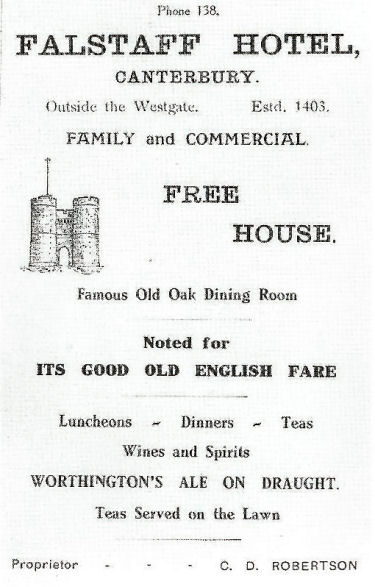
Above showing an advert, date unknown. |
I have just been informed (3/Jan/2016) that the pub has emerged from a
major overhaul and have added a very swish cocktail-style bar that serves
decent beer.
LICENSEE LIST
GREGG Mr 1768+

 MARSH Edward Oct/1769-75+
MARSH Edward Oct/1769-75+

MILES William to Nov/1787


HADLEE George 1805-Sept/09
 FOORDE Richard Sept/1809-30/Dec/26 dec'd
FOORDE Richard Sept/1809-30/Dec/26 dec'd

FAGG George 1828-July/33
 (Sir John Falstaff
(Sir John Falstaff
  ) )
DOUGHTY John July/1833-Oct/1838

FOX Robert G Oct/1838-Apr/43

 TREVOR C Apr/43+
TREVOR C Apr/43+
BIRCH Edward Sept/1843-Nov/50

COULTER Susannah Nov/1850+
MULLEN Robert Joseph 1858+

ROBERTS
PACKMAN Isaac 1861+ (age 50 in 1861 )
(Falstaff Tap) )
(Falstaff Tap)
FLETCHER Ann 1861-Apr/63 
YOUNG John April/1863+
SPENDRIFF Richard to Jan/1864
SMITH Thomas Jan/1864-67+

MOORE Mrs Charlotte Ann 1874-Sept/84
    
SMITH Charles Sept/1884+ 
READE James Mar/1885+ (from Southampton)

HATTON Miss Sarah 1889-91+
 
LIDINGTON William 1903+

STEPHENS G 1909+
 TRUEMAN W Mr Aug/1912+
TRUEMAN W Mr Aug/1912+
KEMP Herbert 1917+

SHEPHERDS Marshall Mr to Mar/1920
 ROBERTS Fanny Mar/1920+
ROBERTS Fanny Mar/1920+
ROBERTSON C D ????
https://pubwiki.co.uk/FalstaffHotel.shtml
 From the Pigot's Directory 1824 From the Pigot's Directory 1824
 From the Pigot's Directory 1828-29 From the Pigot's Directory 1828-29
 From the Pigot's Directory 1832-33-34 From the Pigot's Directory 1832-33-34
 Stapleton's
Guide 1838 Stapleton's
Guide 1838
 From Bagshaw Directory 1847 From Bagshaw Directory 1847
 From Melville's Directory 1858 From Melville's Directory 1858
 From the Post Office Directory 1867 From the Post Office Directory 1867
 From the Post Office Directory 1874 From the Post Office Directory 1874
 Greens
Canterbury Directory 1868 Greens
Canterbury Directory 1868
 Census Census
 From the Post Office Directory 1882 From the Post Office Directory 1882
 From the Post Office Directory 1891 From the Post Office Directory 1891
 Historic
Canterbury web site www.machadoink.com Historic
Canterbury web site www.machadoink.com
 Whitstable Times
and Herne Bay Herald Whitstable Times
and Herne Bay Herald
 Kentish Gazette Kentish Gazette
|














































